Text
Waking Up with PTSD
You go your entire life suppressing the feelings of panic that come with this disease. My therapist calls PTSD the "granddaddy" of anxiety disorders, and there's undoubtedly something nefariously patriarchal about how it all works. Patriarch, after all, comes from the greek roots - patria meaning family, and arkhēs, meaning ruling. In the context of PTSD, anxiety rules with an iron fist. The kingdom of my mind is governed by it.
So what do you do? What CAN you do when your brain is programmed to expect the worst and will adapt your thinking to ensure it's correct?
You focus on every little thing except the black hole that lives in your chest, certain that ignoring it will make it better. You live like if you do not acknowledge the fact you were hurt, or abused, or traumatized, it can't grab hold of you. Come to find out that in the act of suppression, you've exacerbated it all the more.
The only other option you have is to feel the pain, and who could stand that? Who is strong enough to face the reality of injustice, the realities of innocence lost in place of terror? So instead, we seek to contain it - but it's not like jumping on a grenade. It's a hydrogen bomb. You aren't just blown to pieces; you're eviscerated.
You see - You've compressed the things that make you human inside yourself - the molecular structure of who you are is contained by the ways you've coped with it. Your need for distress manifests in your interests such that they are indistinct from your personality - you climb mountains to feel alive and create risks to feel better.
That's how nuclear fusion works. It contains the raw material necessary for an explosion. With heat and pressure applied, hydrogen atoms combine. To combine, each element must lose a bit of its mass. I combined who I was with what happened to me, and both became lesser for it. Only the explosion was delayed.
In physics, the amount of energy created from a fusion reaction equals the amount of mass converted multiplied by the speed of light squared. Familiar, isn't it? E=mc2. So try this calculation on for size -
If you convert your identity as a person to your status as a victim - how much of your personal "mass" has been lost?
I can't tell you for sure, but I can show you what it feels like.
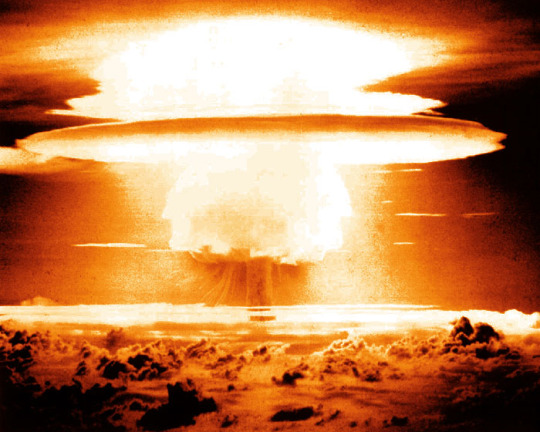
Boom.
You spend your whole life telling yourself that your feelings are invalid. You start to heal, and your first few steps involve recovering what you lost. You look at yourself and realize the way you've been responding to things is not how they really are. You know that, yes, the world was dangerous - but it's not anymore.
The truth is your brain, chemically, does not know how to operate fully unless it's under duress. So when you wake up on a beautiful Sunday morning with nothing to do, you don't relax - you search for the familiar, and your sick mind is all but happy to provide you an answer - a list of the ways you're failing so you can affirm the world is as awful as you believe it is. That beautiful lump of grey matter that's had to adapt to keep you alive has to learn another way. The process of learning is arduous, the process of un-learning - nearly impossible.
But you must.
You acknowledge the truth of what happened, which means making space for some terrible pain. All your life, you've been conditioned to ignore your emotions. Then, you force yourself to acknowledge them. Finally - after months or years - you regain touch with yourself again - you put the puzzle of yourself back together - you know what hurt feels like, but you also know joy - and then the worst realization of all is waiting for you as soon as you untangle yourself from the shame.
And that's the really fucked up thing about PTSD: Not all your feelings are valid.
You go from one extreme - absolute denial - to the other - radical acceptance. But the majority of your living is done in the grey. I might wake up on a Sunday and feel like I have nothing of value to provide in this world - but it's just not true. Healing means recognizing which feelings are worth consideration and which are echoes of trauma gone by.
The work is making space for what was while reaching for things as you know they're meant to be.
7 notes
·
View notes
Text
Nine years ago today, on the eve of my 22nd birthday, I woke up knowing I would meet an elephant, and that's precisely what I did.
I bought new clothes for the occasion. I woke up early and curled my hair. The day promised to be a special one, worthy of the extra effort I took in welcoming it. Ian drove us the 3 hours from Sarasota to Ocala, and we arrived at Two Tails Ranch, an elephant rescue in central Florida. The ranch is the only privately owned elephant facility of its kind, unique like so many things are in Florida.
Elephants trumpeted our arrival and accepted every carrot we offered before it was time to climb aboard. It was one of the happiest days of my life – not just the chance to interact with an animal I admired in a space they were well cared for – but the thoughtfulness of my partner who would gift me an experience of such deep meaning. It was a happy birthday, indeed.
So why, then, were my palms sweating? Why did my heart keep pounding in my chest? Why did my breath catch when the keeper stood up to speak? With nine years of distance, I finally understand that day through the lens of Post-Traumatic Stress Disorder. In that moment, I just felt crazy.
You see - March 9th isn't my birthday. It's his. Because the universe has a mean sense of humor, the man who abused me celebrates his existence the day before I celebrate mine. We were born one day and seven years apart. When we were a family, we'd celebrate together. It's an odd thing to share birthday cake with your abuser, but it's something I did for ten years. I was a decade removed from my abuse at 22 years old, but I was just beginning to understand its impact. I steadied my shaking hands by grabbing Ian's. I told myself what I always did - that today was just a day, and I'd get through it.
From the time I first began to understand what happened to me, that I was a victim of something truly evil, I vowed to live above the influence of that abuse. I was naïve. I didn't realize how little say we have in how our brain encodes its traumas – that the mental flinch I made when confronted with reminders of the past, like birth dates, was indicative of so much more. I ran from abuse into the arms of achievement, and I was comfortable there. That day, however, my hands wouldn't stop shaking. I had pushed on but never healed.
The keeper stood before the small crowd and introduced the elephants like old friends. "This is Luke," she said, and I lost my remaining breath. I would be celebrating my birthday with an elephant who shared the name of my abuser. Happy birthday to me. It was a relatively cool day, even by Florida standards, but I was sweating.
I told myself it didn't matter. That Luke didn't have power over me anymore. That a name, by itself, isn't evil. I even bought a magnet with Elephant Luke's picture on it. I could look at the magnet as evidence of what I could overcome. It served as evidence of how little I was bothered by something that happened so long ago and wasn't I doing fine? Wasn't I? The magnet lived on my fridge, but I still avoided looking at it. I realize now that this is also the perfect metaphor for how I treated my abuse – affixed to me by a force I didn't understand but not as something that needed my attention. By 30, it would demand it.
I would return to Two Tails several times over our years in Florida. I took my brother the day before we got our elephant tattoos, and I took my stepsister when she visited with our parents. My brother knew about my abuse, having witnessed its discovery, but I had never told my stepsister. I rarely told anyone. I didn't know the shame would cost me my family.
Thirty found me in a much different place than 22. In many ways, I had become the woman I always wanted. I had a pilot's license and a master's degree en route to a Ph.D. I'd climbed three volcanos. Ian and I were married and happy. I had a growing army of nieces and nephews to call my own. My stepsister announced she was pregnant that year, and I was overjoyed. Ian and I had moved from Florida to Washington to be closer to family, and as soon as we arrived, that family promised to grow. But it didn't. Instead, it exploded.
My stepsister named her child Luke. She announced her chosen name during her pregnancy, and I knew I had a decision to make. First, I had to tell her. That part wasn't a choice. I also had no choice in my feelings; they ebbed and flowed against my will. But I could decide what to do next. If I told her my association, I hoped that would be enough for her to change her mind. I looked at the magnet, at Luke the Elephant with his perfectly crossed tusks, and told myself all the lies I had told myself for years. That Luke was just a name, that the pain of my past didn't bother me, that I could outrun my fear. I tried to promise my sister that I'd love who she created, regardless of his name, and that I wanted to honor her choice. Ultimately, they were promises I couldn't keep. I could not simply put away my past. Trauma doesn't negotiate. It's a terrorist making demands.
Family discussions about the name escalated to full-on panic attacks, and I punished myself for them further. Why couldn't I just get over it? Why did I see the choice between mother and child as involving me at all? Why couldn't I just accept the name? "Move on," I begged. "Move on." No matter how hard I tried, I couldn't gain control. When I imagined holding my nephew, I had to imagine pushing down the thoughts of being molested as a child at the same time. I felt like a failure. All that running I had been doing, and I had gotten nowhere at all. At 30, I reverted to something I hadn't done since I was 21. I cut my wrists to manage my pain. It had to go somewhere, and instead of letting it go, I poured it back into my body.
I was so afraid. It felt like no matter what I did, the story of my abuse would somehow become a part of my nephew's story – especially if I wasn't healed. I couldn't accept it, and I couldn't move on. The pain had to end with me. I asked my sister to change the name and told her, honestly, about my past and its consequences. I went to therapy and received the diagnosis of complex PTSD. Still, her mind didn't change. I removed myself from our shared family. It felt like the only way to keep the new Luke safe. It felt like the only way to keep myself safe, too.
The magnet still lives on my fridge. It's a complicated token of my journey, but one I can make regular eye contact with now. I've realized that healing isn't an outcome as much as a practice, and I know I'm making strides. Still, days are hard. I may never feel safe enough to return to my family as I did before. The pain of loss and grief has become as much a part of my story as the abuse itself. The challenge is to accept that my needs are valid and that I am not less because of them.
I am not less because someone chose to hurt me. I am not less for the ways my brain and body adapted to keep me alive. I'm not less because I am unwilling to engage in relationships that don't consider my needs. I am human. Beautifully complicated, full of both darkness and light.
Last year I climbed a volcano for my birthday. This year, I climb a mountain of a different kind. I've spent 30 years in the valleys of my shame. Afraid to write this down, afraid to share it. Worried that my words might only be honored or believed if they were delivered in the right way. I'm done with all that. I'm 31 tomorrow, and that makes me a grown-up. It's my turn.
So here it is, universe. His name. My secret. You can take it. I'll keep the parts I need – the bravery it gave me, the strength. I've bartered with the universe before – exchanging pain for empathy and hurt for care. Today I offer shame for something beautiful. Shame in exchange for the truth of knowing who we truly are. I have lived for 30 years, afraid that people would discover what I am. I falsely equated my identity with my victimhood. I have lived 30 years, ashamed of myself for being abused. Tomorrow? I'm 31. And I'll wake up believing this truth: Who I am is not what happened to me, and I am enough as I am.
Happy fucking birthday to me.
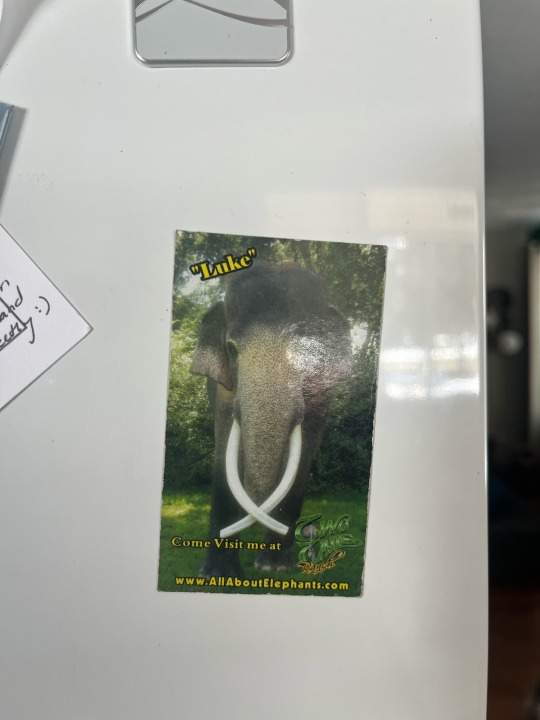
52 notes
·
View notes
Text
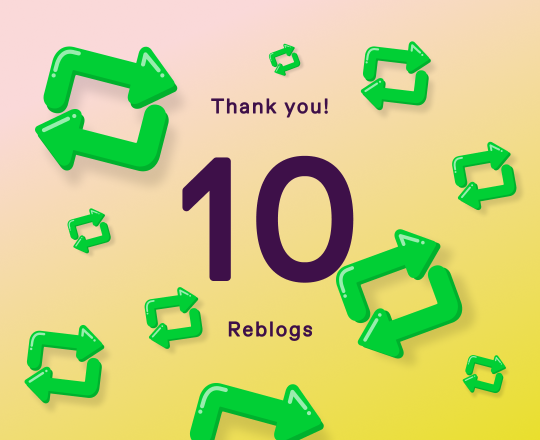
Thank you @wondernerd194 and everyone who got me to 10 reblogs!
I got my first tattoo when I was 22 years old. My big brother came for a visit - we’d been best friends living on opposite coasts for 2 years by then. A giant Samoan gentleman named Buffalo kept the shop open late to bestow my first ink - a small elephant on my rib cage. Elephants communicate across continents, and it felt good to capture that kind of forever with my brother by my side. We’d always be there for each other - even if just through rumblings. My first tattoo meant “I love you” to my brother.
Just a year later I’d get the country of Iceland tattooed on my calf. I wanted to memorialize the trip I’d taken there. I had traveled by myself to a foreign country and scuba dived between the earth's tectonic plates in a glacial lake. I put the Icelandic word for love - “elska” in the outline of the continent because Iceland wasn’t just the setting of my first solo adventure. A boy named Ian Tanzer would show up 5 days into that trip and bend what he could of his broken knees. He proposed behind a waterfall. We celebrated in hot springs and by feeding Oreos to Icelandic horses. I felt I found my whole heart in Iceland. I found myself and my soul mate on its shores. My second tattoo meant “I love you” to me and the man I’d marry.
My third tattoo was a symbol from the Harry Potter series - the Deathly Hallows. I got it at 24 when my best friend, Reece, and I found ourselves back home together. Reece and I became best friends in the fifth grade when he was told to clean the chalkboard at recess. I offered to stay behind and help, a real Hermione Granger. Somehow our board cleaning devolved into a 409 war. We shot the cleaning material across the entire classroom, and when class resumed we were all but doused in bleach. Our friendship was born of mischief. He and I would wait in line together at every midnight release of the Potter series - at bookstores and movie theaters, alike. We’d be in Europe together, as sophomores in high school, for the release of the 5th movie. Not to spoil it for you - but Sirius Black dies. I sobbed into Reece’s shoulder outside the London theater. It wouldn’t be the last time I’d need that shoulder. My third tattoo - which later grew to read “mischief managed” meant “I love you” to my best friend.
That’s when it happened.
About 6 months later I was marrying my husband, and I couldn’t keep the secret anymore. I couldn’t walk into that next phase of my life without being honest. So. 3 days before my wedding I told my dad I had tattoos. I knew he wouldn’t like it. My brother's tattoos had strained their relationship - but my brother was also living under my fathers roof. I reasoned that since I was independent and doing well on my own (at 22, 23, and 24) that his usual arguments wouldn’t apply. I knew he’d be mad. I didn’t know it would be our last real conversation - that he wouldn’t attend my wedding. At 30 we are fully estranged.
And today is his birthday.
And five years after he’s turned his heart from me I still wish I could wish him a happy birthday. That’s grief.
I’ve got more tattoos now then I did five years ago. I added the flowers of my wedding bouquet to my rib cage. I covered my Iceland tattoo, but I love that it’s still almost there. It sits beneath Mount Rainier, a compass that points NorthWest, and a triangle outlined by lilacs. I missed my home more than I loved Iceland. Now I’ve climbed the mountain I honored on my skin. I got a bee on my ass that reminds me to “live one life” as an homage to a spirit quest taken solo in Peru. Not to mention the pilot I’ve got on my quad - I think that one might be more of a self-portrait than any of ‘em. Who I see myself as when I fly. The color wheel on my forearm is my favorite and most useful. Oh - and a few stars on my wrist as another nod to Harry Potter. I know. One Harry Potter tattoo is enough, but two felt better. Reece got a matching one within a week of mine, of course.
I wear myself on my skin, and at the site of it my creator turned from me. That hurts. It also gives you superpowers. I have been made stronger for this - so I have to be grateful for it. The last words I said to my father were this.
He asked if I would do it differently now. Knowing what I know - knowing how hurt he was - knowing that it would lead to (at that point) a year of not speaking - would I do it all the same?
I looked him in the eye and said, “I would not change the tenets of my character for you or anyone.” And that was that.
If someone turns from you in your power - they are not meant for you. And it’s not wrong for you to let them go. That’s the lesson I learned from my father. I don’t know why - but he could not see me. He likely never will. And that’s okay.
Because I am okay. I am healing and grieving. But - also - creating something beautiful.
So Happy Birthday, Dad. And fuck you
126 notes
·
View notes
Text
I got my first tattoo when I was 22 years old. My big brother came for a visit - we’d been best friends living on opposite coasts for 2 years by then. A giant Samoan gentleman named Buffalo kept the shop open late to bestow my first ink - a small elephant on my rib cage. Elephants communicate across continents, and it felt good to capture that kind of forever with my brother by my side. We’d always be there for each other - even if just through rumblings. My first tattoo meant “I love you” to my brother.
Just a year later I’d get the country of Iceland tattooed on my calf. I wanted to memorialize the trip I’d taken there. I had traveled by myself to a foreign country and scuba dived between the earth's tectonic plates in a glacial lake. I put the Icelandic word for love - “elska” in the outline of the continent because Iceland wasn’t just the setting of my first solo adventure. A boy named Ian Tanzer would show up 5 days into that trip and bend what he could of his broken knees. He proposed behind a waterfall. We celebrated in hot springs and by feeding Oreos to Icelandic horses. I felt I found my whole heart in Iceland. I found myself and my soul mate on its shores. My second tattoo meant “I love you” to me and the man I’d marry.
My third tattoo was a symbol from the Harry Potter series - the Deathly Hallows. I got it at 24 when my best friend, Reece, and I found ourselves back home together. Reece and I became best friends in the fifth grade when he was told to clean the chalkboard at recess. I offered to stay behind and help, a real Hermione Granger. Somehow our board cleaning devolved into a 409 war. We shot the cleaning material across the entire classroom, and when class resumed we were all but doused in bleach. Our friendship was born of mischief. He and I would wait in line together at every midnight release of the Potter series - at bookstores and movie theaters, alike. We’d be in Europe together, as sophomores in high school, for the release of the 5th movie. Not to spoil it for you - but Sirius Black dies. I sobbed into Reece’s shoulder outside the London theater. It wouldn’t be the last time I’d need that shoulder. My third tattoo - which later grew to read “mischief managed” meant “I love you” to my best friend.
That’s when it happened.
About 6 months later I was marrying my husband, and I couldn’t keep the secret anymore. I couldn’t walk into that next phase of my life without being honest. So. 3 days before my wedding I told my dad I had tattoos. I knew he wouldn’t like it. My brother's tattoos had strained their relationship - but my brother was also living under my fathers roof. I reasoned that since I was independent and doing well on my own (at 22, 23, and 24) that his usual arguments wouldn’t apply. I knew he’d be mad. I didn’t know it would be our last real conversation - that he wouldn’t attend my wedding. At 30 we are fully estranged.
And today is his birthday.
And five years after he’s turned his heart from me I still wish I could wish him a happy birthday. That’s grief.
I’ve got more tattoos now then I did five years ago. I added the flowers of my wedding bouquet to my rib cage. I covered my Iceland tattoo, but I love that it’s still almost there. It sits beneath Mount Rainier, a compass that points NorthWest, and a triangle outlined by lilacs. I missed my home more than I loved Iceland. Now I’ve climbed the mountain I honored on my skin. I got a bee on my ass that reminds me to “live one life” as an homage to a spirit quest taken solo in Peru. Not to mention the pilot I’ve got on my quad - I think that one might be more of a self-portrait than any of ‘em. Who I see myself as when I fly. The color wheel on my forearm is my favorite and most useful. Oh - and a few stars on my wrist as another nod to Harry Potter. I know. One Harry Potter tattoo is enough, but two felt better. Reece got a matching one within a week of mine, of course.
I wear myself on my skin, and at the site of it my creator turned from me. That hurts. It also gives you superpowers. I have been made stronger for this - so I have to be grateful for it. The last words I said to my father were this.
He asked if I would do it differently now. Knowing what I know - knowing how hurt he was - knowing that it would lead to (at that point) a year of not speaking - would I do it all the same?
I looked him in the eye and said, “I would not change the tenets of my character for you or anyone.” And that was that.
If someone turns from you in your power - they are not meant for you. And it’s not wrong for you to let them go. That’s the lesson I learned from my father. I don’t know why - but he could not see me. He likely never will. And that’s okay.
Because I am okay. I am healing and grieving. But - also - creating something beautiful.
So Happy Birthday, Dad. And fuck you
126 notes
·
View notes
Text
Which Hug?
A Story of Pandemic | Allyson Tanzer
It's been nearly two years of uncertainty in the face of the COVID-19 pandemic. Two years of wondering if that which makes us human - our innate need for connection - will be our undoing. It's bothered me how we labeled that thirst for others selfish, especially when the rules were - at first - so unclear and changing. That I might endanger someone with my presence? So often, the presence of others has kept me alive… but fear is powerful. I'll never forget my mom sanitizing our groceries before bringing them inside. Fear makes us crazy.
Maybe the question of connection is not the question you've been asking - maybe your question has been one of survival. By that standard, I've been lucky - that my livelihood was kept alive. That - through some arbitrary standard - I remained essential as I watched my heroes furloughed and unemployed. I've worked for a company for nearly two years now, having been through its front door less than ten times. I have relationships with people I consider friends that have just now begun to transition offline.
March of 2020 marks a global milestone - the month that became the marker for Before COVID and After. Ian and I moved from Florida to Washington that month, which added to our sense of displacement as we settled into an entirely new version of ourselves and the rhythms of the After COVID life simultaneously. My last gathering of over five people was a welcome home party of 30 for my birthday. The restaurant we ate at closed the next day.
And for the first few months, everyone I knew stayed healthy. The virus remained a boogeyman made real through television broadcasts and reporting. How many dead. How many days. How many weeks to flatten the curve. Then everyone I loved got sick at once, and I cried for hours - for my brother and his wife and their daughter, for my mother and my dad. No treatment. Terrifying odds. Pre-existing fucking conditions.
Contact tracing added an interesting element to the dynamic of sickness, which complicated things further. My loved ones got better - others didn't - but in either case, you often could guess at where your illness came from if you didn't explicitly know. Who was testing positive around you? Who was to blame? It gained stigma reserved for sexually transmitted diseases - only socially transmitted. I questioned if the infected were the irresponsible ones? The audacity to move about life at all… Hard to believe when my mother got sick from holding her grandchild.
This illness has been so wicked.
It was finally my turn this week, and it felt overdue. Since the pandemic started, I've taken every mandated (and almost every recommended) precaution with very little exception, but my boundaries expanded as time moved on. I saw different versions of this pandemic as a result of my cross-country ties and struggled at reconciliation.
In the Washington Pandemic, I meandered through national forests to find masked individuals wandering in wide-open natural spaces. The precautions here felt like overkill. On mountain paths, folks would raise their masks in crossing if their faces weren't covered already. Businesses and restaurants stayed closed for months, and winter hit us hard. Meals were enjoyed in passenger seats and on kitchen counters as we unpacked to-go box after to-go box after to-go box. EAT LOCAL, papers proclaimed. Why eat local when you're eating the microwaved memory of a meal? I asked. When temperatures dropped below tolerable, we began to accept the risk of being inside. We formed quaranteams. We stuck to the familiar haunts and people or stayed at home.
I moved back to Washington State to be close to my family, yet they remained out of reach in a parade of drive-by birthdays and driveway baby showers. I slowly began to deny the realities of the imposed isolation. I asked my family in California to accept the risk of my travel for the sake of my company, and I got on my first airplane of the pandemic to visit my brothers' family. And I survived. The California pandemic was spent in parks and with a better rotation of delivery options, but mostly the same. The Florida pandemic was not.
Back in Washington, suspended in the free-trial version of my hometown and emboldened by a successful trip to California, I booked a trip to a place that felt more like home than the cold winter that found me in Spokane. Asking my Florida family to accept the risk of my travel, they agreed to keep me for a week in January. Here lived the pandemic that wasn't. The abundance of outdoor seating and defiance of Floridians, in general, gave a sense of nonchalance to the ongoing pandemic that was wrong in the other direction. Washington pandemic, too cold. Florida pandemic, too hot. My goldilocks optimism needed just right, and I couldn't find it.
I made my peace with the risk I was willing to accept. A true moderate, I suffered berating on both ends - from those who would like to see me self-isolate after even modest social interaction and those who thought my choice to be vaccinated originated in fear rather than reverence for science. From Florida, I carved a more personal boundary about where my comfort was, and this line helped me move with more confidence and security. It helped that my level of security aligned, often, with mandates. My job was not at risk. I balanced screen-tied work and my love for travel and enjoyed lenient cancellation policies and empty middle seats. I cultivated hobbies I loved. I stayed healthy. Entering my second year of the pandemic, I felt that if I could just turn off the news, my life would be unaffected by the troubles I saw there. I stopped watching cable news in January. It was a beautiful year. Travel between states felt like travel between foreign countries as I navigated different degrees of mandate. My strategy stopped working this December.
Two years and four eye-watering swaps per nostril later, I'm confirmed positive for COVID-19, and just as I feel this toxic thing in my body, so the toxicity turns to my mind. Two years of second-guessing every social interaction for its quality in content as well as germ-spreading. Two years of wondering if the risks I take traveling - to weddings, to visit my grandparents, to see my nieces and nephews growing up - are worth imposing on every person I then meet. That the responsibility for my neighbor could fall on me? When an entire state full of people couldn't give a damn? Here she was. COVID-19. And on which hug could I draw causation?
Maybe it was the one from the Mayor. The Mayor from Lafayette, Pennsylvania, made a promise to himself when his son died that he'd never miss the opportunity to shake a veteran's hand. He told me he'd cross the street for a man in uniform and that his current record for any single event was five thousand hands. When the Mayor got back on our tour bus at the end of the Army/Navy game, he announced that he'd stopped counting at ten thousand. The last I had seen him, he was cheering in the Army's student section, screaming his lungs out on MetLife's Jumbotron. Maybe it was his hug. I had put a yellow rose in his lapel in honor of his accomplishment that day—the hug after ten thousand handshakes.
Maybe it was the hug from my best friend, Phill. Just two weeks before that hug, I had asked where he'd be the first week of December. Our long-distance friendship relies on coincidences of this nature - If he was in New York, I had a reason to be there. We made it happen. Maybe it was his hug. The one that welcomed me to the comfort of a week in Phill's light and promised adventure and laughter. I had touched my face, after all, to wipe the tears of joy his presence gave.
Maybe it was the hug I gave my chosen sister. The girl who lives in an elite club: she possesses a vision of herself and her potential far beyond the dysfunction that follows her. It's a struggle with which I am familiar. Maybe it was the hug I was giving when I told this girl all the truth I could muster - that her dreams will mean letting go of people, but she will discover magic in return. Maybe that's when I got it- When I held onto the girl sobbing for the first time since her Papa died of COVID-19.
I don't know which hug it was, but I know I wouldn't take any of them back. It might not have been any of them at all. The New York Pandemic entering its second year is the most mandated space I've been in - the only place I've gone that has consistently asked for vaccination and identification cards upon entry to clubs and restaurants, for example. I had strangers lean in close and speak into my ear over loud music for the first time in two years, and it felt almost reckless. I am not surprised I got sick. That weekend broke records for case numbers. I attended the Army/Navy football game among families who lost members in combat, and not a single person in that stadium wore a mask. I'm struggling to make sense of what all this says about freedom. I just know I wouldn't take back a moment. Two years later - I'm ready to accept the risk of getting sick, and that's what happened.
I traveled the three thousand miles from New York to Spokane, not knowing the fever that waited for me on landing. I put strangers at risk. I brought the risk of New York City into my home, asking my husband to sacrifice two weeks. Two weeks - the prescribed quarantine period and consequence to a risk Ian didn't assume for himself or get to enjoy.
The darkness came quick. This illness carries with it a stigma. I felt - feel - unclean. Contagious. I take pride in independence, so feeling this responsible for such a negative consequence for a person I love so much ruined me. Two panic attacks in three days, ruined. These truths - that the pandemic is painful - that I am contagious - Truths that aren't meant to be hurtful sting all the same. Ian remains healthy but at constant risk by my presence. We're doing the best we can to stay six feet away in a house of a thousand square feet. It's been sixteen days since I've kissed my husband properly. Nine days to go, and we'll be quarantined through Christmas.
Today is the first day I've felt like a person since the cloud of coronavirus, and by all measures, I've had a mild case: flu, aches, pains, fatigue, but no respiratory or neurological symptoms. I could continue to work remotely through most of my week - taking sparing vacation and not risking the health of my co-workers. Again, it's luck that colors my journey. Returning to myself after this challenging week, I had to reflect on my experience and find the lesson in all that discomfort.
I cannot ask myself which hug anymore. It's not a question I'm designed to ask. I cannot police the love I give out when the world is so needing of it. I think moving forward in the second year of this virus means finding the line of risk we tolerate within our ecosystem and living bravely, sometimes wisely and sometimes foolishly, within it. But this year - I'm going to find ways to move forward in this pandemic and make sure the people and places I love receive the energy I have to give, to take even better care of myself, to serve with grace, to show compassion, to be curious. To ask every question I can think of except, "Which hug?"
#pandemic#writing#writersoftumblr#creativewriting#learning#growth#storytelling#whichhug#thehoneybuzz
0 notes
Text
LESSONS FROM THE LIQUOR STORE
Lessons from the Liquor Store in NYC // A midnight comedy show and orders of jaeger by the pair left us exhausted and giddy as usual as we collapsed into Phill's New York City apartment. Morning promises responsibility. Early bands of light break through Phill's curtains as shoe-clad and fully clothed, we sink deeply into the couch as if never to rise. It would be a waste of valuable time to undress as the sun creeps higher - reminding us of the 15 guests we expect in a few short hours. The light mocks us, so we shut it out by closing our eyes. Upon opening them, it is properly day and time to get started. We begin working on our barbecue.
Head screaming and mascara running in earnest from my bleary eyes, I calculate the time between now and our guests' arrival - not even two hours. Two optimists, we hadn't set an alarm. In moments, Phill had gone from horizontal to vertical, to amateur caterer without wiping the sleep from his eyes. He removes the full contents of his fridge to begin food prep. From the furrow of his brow and the frenzy of his pace, I know we share both an intense hangover and a growing sense of urgency. Phill would handle the food; my job was more important. I was to buy the alcohol.
I leave the apartment in the same clothes from the evening before and dash to the elevator. List in hand, I embark on my quest to the liquor store at Hudson Yards. Red Wine. White Wine. Beer and hard liquor. An hour and a half to go.
My destination is the Shops at Hudson Yards. It's a setting that breeds a kind of pretentiousness specific to the northeastern United States. The fine people of New York, above mere mall-dwelling, have made up a new name for the structures that resemble malls. So despite being a mall, the Shops at Hudson Yards is distinctly 'not-mall' such that New Yorkers have no need to debase themselves. Modern art galleries and interactive exhibits peak between retail spaces offering Lululemon, Gucci, and - luckily for me - bougie liquor stores and food markets. I have run up a flight of stairs, walked up two sets of escalators, and arrived at the third-story market and liquor store.
I assess.
At best, I am an irregular consumer of alcohol. At worst, I order jaeger bombs in the quad. I worry the rooftop barbecue hosted by my sophisticated friend for sophisticated people warrants a more refined palette. After all, Phill's mother is an Image Consultant, and I'd like her son to represent her well, even if at a distance. Unfortunately, a refined palette I do not have. I enter the shop and am immediately overwhelmed by the selection.
For the second time that morning, I find myself calculating with time. It is 10 AM on the East Coast. Subtracting 3 hours makes it 7 AM in the west… far too early to call for rescue… But I call anyway.
"Mom?"
Her voice is groggy with tired when she responds. Best I get to the point. I rush:
"Mom, they sent me to the liquor store, and I don't know a single thing about wine!!!" My mom starts giggling, hearing and sensing my desperation. She wakes Dad.
Except for the clerk, I am alone in the shop, and my voice carries throughout the store. The clerk dutifully organizes the rows of spirits, a gentle smirk - bemused - plays his lips. His white hair tied neatly in a ponytail at the nape of his neck; he wears round glasses. He moves more like a proprietor than a clumsy shop hand, dancing gracefully between aisles. He wears a black apron like a 3-piece-suit, exuding a masculine elegance as he examines bottles, glasses pushed to the end of his nose. He peruses, keeping mercifully busy as I ask my mother and father the difference between Cabernet Sauvignon and Merlot and sidestep conversations about price-gouging.
"Even in New York," Dad said, "you should be able to find wine under twenty dollars..."
The cheapest thing I find is $15.
Time moving swiftly, I can no longer delay the inevitable.
I boldly make my selections.
The Cabernet is from the Columbia Valley. This comforts me—a Washington wine from a Washington guest. Even if the taste turned out to be foul (I shuddered), at least it would be well-justified. I include a merlot from Santa Barbara as a nod to California, another autobiographical flare. In place of taste, I figured I would provide a narrative. Isn't that what people expect when drinking fancy wine? I unceremoniously added the cheapest Chardonnay I could find to my selection. I had worked hard on the cab, and the merlot - $15 Chardonnay would have to do. Dad would be proud.
I am laden with two bottles, one phone, and two hands. The white-haired clerk glides by and relieves me of my bottles almost fluidly. I thank him, barely breaking stride in my telephone call. His service is seamless and elegant, like a well-trained Butler. My warmth towards him grows as I realize how this man has silently built his rapport.
Final selections made, I move to the counter. Like the cigarettes and chewing tobacco of lesser establishments, Vodka is kept behind the register, and I'll need assistance to retrieve it. Retrieval will be no great task as I have been given a name and specific instruction. The clerk is standing by.
I thank my parents endlessly. They bid me farewell and hang up as they roll back over to catch a bit more rest so early on a Saturday. Certain that the noble proprietor has heard the entirety of my call, I approach the counter and confess.
"They sent the least qualified person to buy the most important thing," I say, shaking my head.
He laughs.
"You've done wonderfully!" He glows, without pause, diving into the relative fruitiness and suited-ness of the wines to our occasion. His sung praises made a beautiful song, but to try and mimic it now would be a disgrace. A person like me simply wouldn't do it justice. He grabs the second bottle from the front when I ask for the Vodka by name. His confidence and precision transform the shop into a library tended to by an obvious lover of books. A noble proprietor, indeed.
"Would you like this in one bag?" He asks.
I hesitate. Like the question of which wine, I do not know the correct answer.
"It could get heavy..." he guides, sensing my indecision.
"One bag is sufficient," I answer. "I still need to collect the beer. Perhaps the wine will act as a counterbalance." He chuckles and loads the remaining bottles into the bag. His eyes know something his mouth won't say.
"I'll keep these here," he tells me, "come back when you've purchased the beer." He nods towards the shop next door.
I am grateful for the gesture and promise to be back soon.
Fifteen long minutes later, I return fully encumbered by two large, heavy bags, digging red lines into the skin of my arms as their weight pulls downward. The bags carry the burden of 24 craft beer bottles for the guests. Each painstakingly selected for variety and taste. I will carry these bottles through the mall, three city blocks, and to the roof of Phill's apartment.
The clerk smiles as I walk through the door.
"Are you strong?" He asks, handing me the wine.
"Yes, sir," I say, my arms falling with the weight.
"Then…" he paused, laughing and stepping back to examine me. He smiled and continued, "Well then... They sent the exact right person to buy the beer."
He was right, too. I made it back to the apartment with my heart pounding from the effort of carrying the bags but ahead of schedule. None of our guests would comment on the wine, neither its fruited-ness nor its suitedness to the occasion. It wasn't the first lesson New York taught me, but it remains one of my favorites.
No matter how fancy your wine is - or isn't - what matters most is how far you have to carry it.
0 notes
Photo
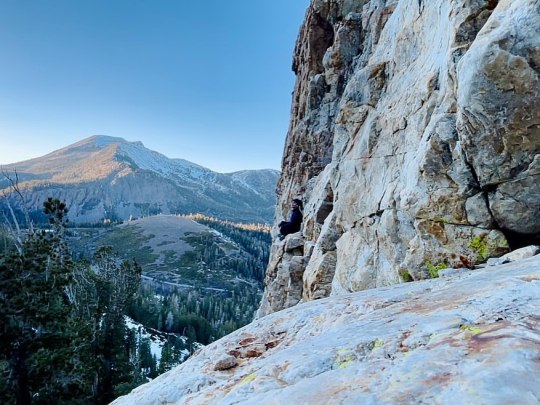
Grateful as all heck. https://www.instagram.com/p/CWuZFcjrqLm/?utm_medium=tumblr
1 note
·
View note
Text
Chasing Baker
My Nana was my greatest adversary.

In an otherwise charmed life, Nana was an immovable force and the only legitimate challenger to my willpower. Not without the warmth one would expect from a grandmother, Nana could be sharp - like a sun-warmed pane of glass. Lesser hearts might have bent to me when I requested accommodation - but not Nana. Nana set a firm bedtime, insisted on efficient tooth brushing, and rather than negotiate with hair tangles, made short work of them in single, swift wrenches when brushing your hair. No nonsense. When you stayed with her - in one of two twin beds in a room made precisely for grandchildren - you often found yourself in bed with the lights out, with no real memory of having gotten there, swept away in the tide of your sheets. Nana was uncompromising, and no arena was more suited to our mutual stubbornness as the dinner table.
I grew up a notoriously picky eater. After a weekend at my Uncle Jerry's, my mom received a hardcover copy of "The Strong-Willed Child" from him as a gift. He had spanked me for not eating chicken nuggets. As evident by its title, the book was meant to coach my mother on parenting strategies for mitigating my innate obstinance. This would not be the only copy of the book my mother received. Though, I think she could have written one by the time I turned 4. I simply refused to eat the things I didn't like, and that was a long list.
A relative once applauded - clapped his hands together in joy- upon learning that I had graduated from having the crusts cut off my bread to full-blown sandwich eating. The peanut butter and honey sandwich was my signature dish and an absolute staple. I'd like to say I've grown out of it - and I've certainly grown having tried llama steak in Peru, lamb heart at the table of a Lebanese family, and Greenland shark in an Icelandic cafe - but it took me a long time to let go of my habits and permit myself to try, and it took some coaxing. My preferences ran deep.
My diet from ages six through eleven included Eggo waffles, peanut butter and honey sandwiches, an assortment of cereals, a handful of specific fruits and vegetables, and the occasional steak when mom thought my iron was low. My mom - on the advice of a pediatrician who told her that if she force-fed me, I'd develop an eating disorder - catered to this preference. Nana did not. They must have been seeing different pediatricians.
Nana took the clear your plate approach - The approach driven by reward and consequence. Finish your plate, cookies delivered. Fail to try, become hungry and hungrier still as dessert passes you by. I took to swallowing food whole, and my mom took to sending me with granola bars on visitations. She'd line the interior of my suitcase like we were smuggling drugs. I'll admit it was an unusual form of contraband, but the measure seemed necessary in a divorced child's duplicitous world. What my mom saw as nourishment, my Dad might see as undermined parenting strategy even under the best of circumstances - which they often weren't. I was hungry, so decided it best to keep things a secret and wrappers out of the trash.
Despite Nana's apparent best efforts, I avoided the eating disorder. Thanks to my mom, I avoided most foods until my early 20s. I don't know who was right. What I know for certain is that I was loved.
When I sat down with Nana after my trip to Mt. Baker, she clutched her heart as she said. "Ally - to think about you as this little girl - and that you would only eat peanut butter and honey sandwiches - to think of you climbing mountains…" she shakes her head, "… well I just can't believe it."
I started to laugh and asked her, "Want to know the best part?"
She nodded, smile in her eyes, full of that sunny warmth - playful and kaleidoscopic.
"I ate peanut butter and honey sandwiches up and down the side of that mountain, Nana," I told her, laughing, and then we laughed together. Growing up is fun, I thought, especially in moments like this.
Laughing with your grandmother is a gift you receive in exchange for time, and it is a beautiful gift indeed. Here is a woman who bathed you, clothed you, fed you - and by the time you're old enough to understand the magnitude of the life she held before all that, she is often gone. I'm lucky to have this time. Nana is 90 years old now, and my mother's mother passed at 74. I never got to have the conversations I wanted to have with my grandmother, who died. To ask her questions like, 'Who were you?' 'What lifetimes made up the love you gave so effortlessly away?'
There is something about mountain climbing that makes you consider those kinds of questions in real-time. There is something about mountain climbing that makes you feel as if you are in the process of 'becoming.' So when, at the parking lot of Grandy Creek Grocery, I met my fellow climbers and our guides - there was a feeling of anticipation and nervousness about who I'd be sharing that story with. Dropping me off, my mom described it like the first day of kindergarten. The first person I met was Sharon.
I had been worried about Sharon. Weeks before, on the pre-trip Zoom call, she stood out from the digital crowd as the most visibly senior person there. Sharon did not look old - she looked undoubtedly the oldest. I think this is an important distinction - particularly to Sharon. I remember thinking - "I hope she is not on my trip because I'm worried she will show me down." A very judgmental thought and the universe saw to its reckoning. Sharon surprised the hell out of me.
She paced the parking lot, and I jumped out of my rig to greet her. We quickly began commiserating. Baker would be her first mountain. I had Mount St. Helens under my belt, but it's not much in the way of experience. We talked about our training plan, recounting long drives to taller places. Sharon was from Wisconsin, and she had to drive 45 minutes to get to peaks at 3,000 - the same as me in Eastern Washington. We had a lot in common. Where I ran, she had been hiking with weight and jogging. Sharon wasn't afraid of hard work. On our drive to the trailhead, I learned that she had just lost 75 pounds last year. I learned later that when Sharon signed up for this climb, she hadn't told anyone in her family she was doing it. She was 62 years old and had never once traveled alone. What on earth possessed her to climb a mountain? I'd be afraid of that question, too.
Sharon eventually fessed up to her family and made the trip official. That's how we found ourselves on the side of a mountain together. I'm embarrassed to have been so fundamentally wrong - but my confession is not without meaning, and I learned an important lesson. Never underestimate a Sharon.
When Melissa, our guide, described Mt. Baker for the first time, she called it by its indigenous name, Komo Kulshan. She then gave us its epithet - "The Great White Watcher." Having now met Kulshan face to face, I can tell you that's precisely how he feels. The summit looms as you navigate through the trees. Stoic in the face of the wilderness that surrounds him. Ice cold, he waits. In the Lummi language, he's called 'white sentinel.' He is persistent, vigilant, and watching.
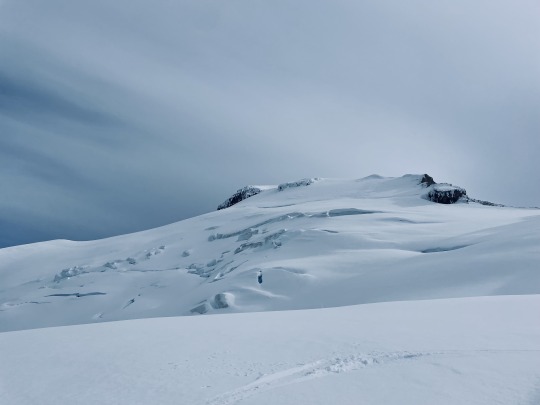
I focused my nervous energy on preparing to meet this mountain by learning what I could about him. I learned that Mt. Baker is 10,781 feet tall, an active volcano, and the second most glaciated mountain in the continental united states (Rainier's got it beat, and you don't count Alaska). It's a formidable mountain, known - as nearly all alpine environments are - for its quickly changing conditions and the perils of its geology. This all, somehow, frightened me less than the thought of meeting Melissa Arnot-Reid. Her legend loomed not in the Cascades - where only a single peak resides above the threshold of 14,000 feet by which the Rockies measure their formidable "fourteeners." Melissa's legend loomed as large as Everest, on who's summit she has been six times - the only American woman to summit without the use of supplemental oxygen and survive. 29,032 feet. Melissa was someone I wanted to learn from, and I was scared shitless of her by reputation.
Suffering a bit of social awkwardness around celebrities, I prepared to meet Melissa by seeking to learn nothing about her at all. The antithesis of my mountain strategy - I told myself our experience would be what it was when we met on the mountain. My job was to learn - to ask my questions courageously - and be vulnerable and bold in seeking truth. I spent a fair bit of time wondering if she might be an ass hole, too. The age-old adage, "don't meet your heroes," drifted in and out of my mind.
In the last 15 minutes of our drive to Grandy's, my mom started reading Melissa's Wikipedia page aloud to me as I navigated the road, undoing months of my concerted preparation. I let her continue, greedy for information. "It says she trains by depriving herself of things - that she'll go without food and water."
"Probably a good idea if you're ever going to be stuck on the side of a mountain without it," I told her. I braced myself for a response. In the past few months, my mother had a growing sensitivity around topics that might suggest I could die on the side of a mountain. Admitting, so blatantly, that mountain climbing was a dangerous sport left me vulnerable to excessive mothering accompanied by exclamations of "Don't you dare!" Instead, my mom sort of nodded and continued, "I'm surprised her baby came out healthy."
My brow furrowed. I hated my mother for saying it. I had avoided a lecture from the mother of the mountaineer but failed to account for the mother of the daughter aged-almost-thirty. My uterus is a topic of conversation around my mother's table. Apparently, so was Melissas. Not wanting to discuss either, I let my mother's comment go unchecked as she continued to list accomplishments. "This article says she's focused on business, not emotions. That she is an incredible problem-solver." Now her reports felt more like cheating - it felt like an unfair advantage to meet someone armed with publicly available information about them. When you Google "Allyson Tanzer," you won't find much about my disposition under pressure. I told my mom it was time to focus and turned up the music.
When we parked, and I went to introduce myself to Melissa, three things happened. As I introduced myself, she first quickly let me know that she would not be giving out hugs due to the pandemic. Then, taking my hand in a firm grip, Melissa detailed that she and our other guide, Adrienne, had critical guide business to discuss and would be with us in a moment. She reported being thrilled to be meeting us as she quickly dropped my hand. Within thirty seconds, I was apologizing profusely and backing my way into the grocery. What can I say - first time formally climbing mountains, and I wasn't sure of the protocol. I fiddled with a bag of Cheetohs and continued to hope that she wasn't just an ass hole.
I went to the bathroom for something to do and remembered what my mother said. Task-oriented. I figured Melissa probably didn't hate me, after all. Despite my earlier misgivings, I was grateful to know a bit about her character, regardless of how 'honestly' that information was obtained. Thanks, Mom.
Our climb began. We left Grandy's in a caravan and parked near 3000' at the winter routes trailhead. On the first day, you ascend to 6000' and establish camp. You carry about 40 pounds, walking 1 mile and about 1000 vertical feet per hour, stopping for 15-minute breaks in those intervals. Conditions are warm, which means you're doing something the mountaineers call "post-holing" - ramming deep holes (as if for a fence post) into the ground as you step through snow that's washed out underneath. It's slow-going and rigorous. An hour and a half in, Melissa reports that we're standing in the location where she usually takes the first break. Unseasonably warm weather with a heavy snow accumulation has made for an exciting start.
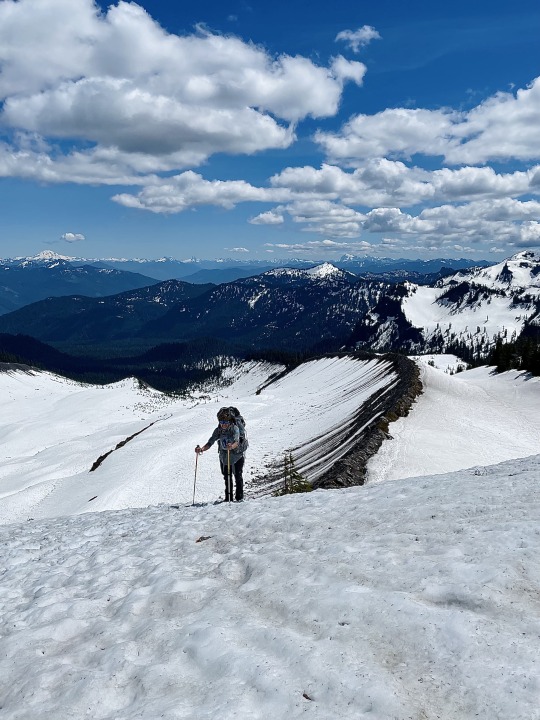
You walk along a canyon ridge formed by a retreating glacier. You realize that time here is not measured in the same cadence that it's known to you. Mountains measure time in millennium, not decades. The formations of rock are carved by years, not minutes. The ground holds a history you can't conceive of - an ancient history of rock and ice. You are constantly struck by feeling small both physically and in your very chronology. I spent the first day happily in awe.
At camp, you maintain - guides (and playfully designated junior guides), boil snow, establish a base, dig a toilet. You assess whether or not you need to poop in a bag and carry it down the mountain with you as you try - for the first time - a rehydrated meal claiming to be chili Mac and cheese. Melissa teaches us how to walk on rope over a glacier. I try to mimic her knots. She redefines your concept of efficiency - breathlessly describing a packing order that accounts for calorie intake, warmth requirements and weight distribution - Every contingency considered. When I win the Ice Ax Rodeo by landing my thrown ax in a particular configuration - all is right in the world. Melissa is a drill sergeant giving instruction. She outlines the next minute - next five minutes - next hour - next day.
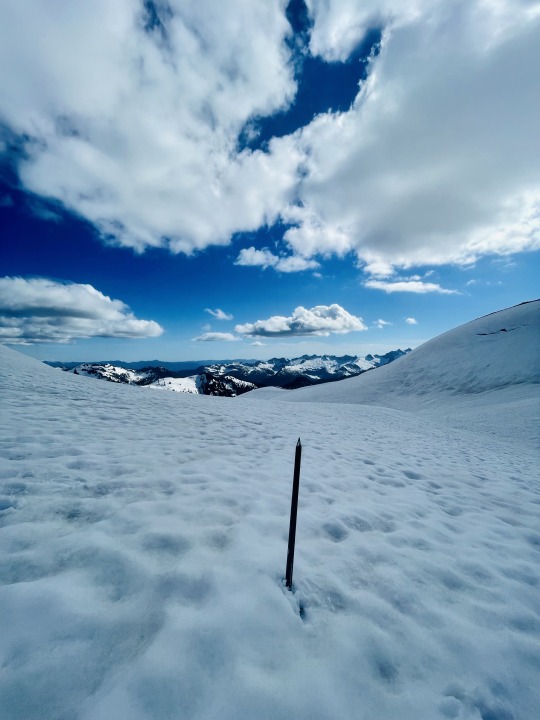
Her matter-of-fact nature reminds me of something. When I gave my parents a ride in an airplane for the first time with me as the pilot in command, I provided them near the same briefing as we were parked on the ramp. It ended dramatically with, "And if anything should happen, you have to exit the aircraft first in the following fashion." At which point I launched myself from the plane. I wanted them to be prepared to fight their instincts to protect me. I’m the only pilot on board - and my job is to protect my passengers, no exceptions. They both described a sense of foreboding and peace at the demonstration. It’s precisely how I felt when Melissa explained how she would be rescuing herself from a crevasse. “If you fall, I get you out. If I fall, I get myself out, but I need your help as an anchor to do so.” She took the approach of coaching us in only what we needed for the next challenge. We would learn crevasse rescue on a need to know basis. At Grandy’s, she told us to expect 48 hours of endurance. At camp, we’re at hour 9. She painted a picture of the following day.
"We'll begin between 11, and 2 am. Expect switchbacks up the glacier, a series of flats, and gains over the next hour. In 3.5 miles, we'll gain an additional 2000 feet - meandering a path through the glacier's crevasses, and it will gradually become steeper over time. About 1.5 miles to the summit, we'll hit the Easton glacier culminating in the Roman Wall. Then, because God has a sense of humor, you have a long flat walk to the summit after the steepest portion. All said it will take us between 5-7 hours to the top."
Frankly, it was just about as simple as that.
My eyes opened at 11:50 pm to the sound of movement outside the tent. Melissa had coached us here, too. "You may not be sleeping," she told us as we readied for 'lights out.' Days from the summer solstice, the sun burned brightly above us at 7 pm. "Remember that you don't need sleep; you need rest. That's what you're getting here at camp. You're horizontal; your feet are out of your boots. Close your eyes, and know you're getting what you need." Felt like a lie, but sure enough, with two hours of sleep, I couldn't describe myself as tired.
I did, however, feel cold. Chilly night temperatures had crept into our tent, and dressing for the day was arduous. I knew to keep my clothes in my sleeping bag. It was a trick I learned from a friend made trekking in the Andes for dressing in the cold. I knew to shorten my trekking poles while climbing, thanks to my guide on that same trek. I'd be leaving my trekking poles behind today, though. Ice axes only. We divide into rope teams. The race begins, but there's no starting pistol - only wind.
Fifteen minutes into our climb and we're struggling to find the rhythm. I'm still shaking the bleariness of the cold. The rope between climbers takes on an interesting dynamic. While it connects you to your fellow climber, it also isolates you from them. You have to maintain a certain distance away from one another while maintaining the same pace. It's a dance with crampons on in glacial ice - a delicate dance indeed - and it's where climbing feels like a team sport. You're all in it together.
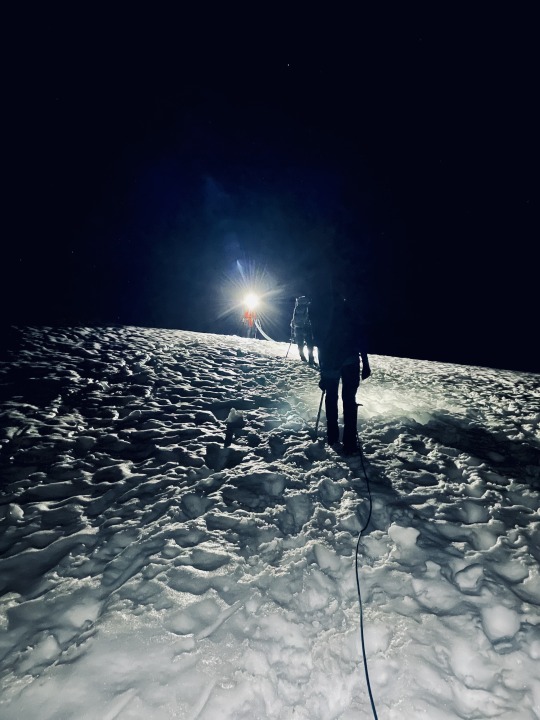
Voices rang out in sequence like a game of telephone - one of our team would need to climb down. We said short goodbyes and waited as Adrienne (guide) descended with climber to camp. We were lucky - we hadn’t been climbing long which meant Adrienne could climb down and back to rejoin her rope. Guide redundancy is a safety net when groups of climbers work together.
Darkness continued. We continued. As you persist, darkness seems to persist along with you. In the first hour, it grows heavy. Your world begins and ends at the light of your headlamp, and that's where you find it—your rhythm. Crampons crunching, breath steady, and the gentle swish of your layers create a sort of timpani, a medley of percussion sounds. Clink, brush, crunch, and clink, brush, crunch, as ax bites ice, the movement of your clothes, and the toe of your boot kicks crampon into snow propelling you forward. There isn't much to think about in this grinding meditation. You're grounded in tugs from ahead or behind you as you march, slowly up. You can count steps, miles, feet of elevation - whatever keeps you moving. Whatever keeps you going up.
Moments before sunrise, we would lose another on our team. I listened to Melissa coach her. "What we're headed to is going to be harder than what we've just done. If how you are feeling is taking away from your ability to focus on your next step - I can only tell you that it's not going to get easier from here." That's when I saw the decision on her face. Another round of goodbyes - this one a bit more somber. She had worked so hard.
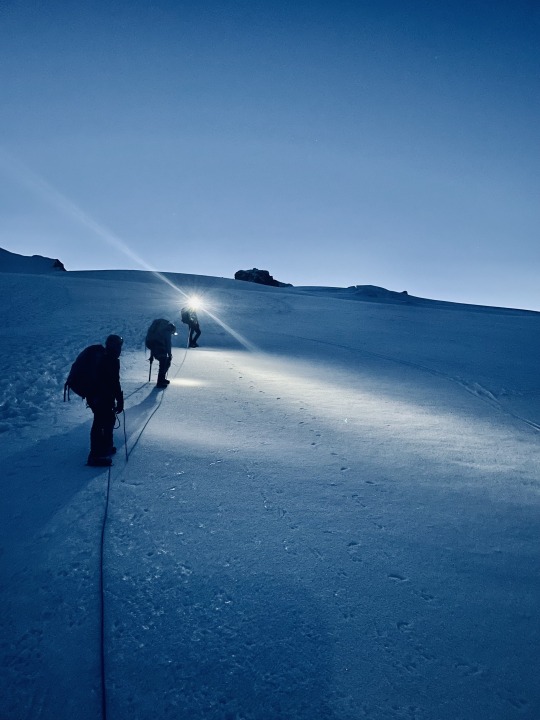
The decision to descend is a difficult one, but it’s one of the most important you can make. There are steep consequences to being in over your head in a place so remote. The summit is a siren, beware. Melissa - aware of the remaining teams intention to summit - advised us to plug our ears as she told the descending climber the Sherpa belief that a mountain won't let you summit for the first time if it likes you. Mountains bring you back. Further, she coached, the decision to go down can lift an entire team's chance of success if you feel you're a liability. Recognizing yourself and your limitations truthfully is a mountain in itself. That's the summit this person made in her decision to descend.
Like a good Agatha Christie novel, our list of characters dwindled. We added layers and continued - five of the original eight. Melissa was right, again. After we lost the second climber, our ascent became a proper climb. From that point forward, if anyone decided to turn around - we would all have to. There was only one remaining guide, and she had to protect all her climbers, no exceptions - me in the cockpit all over again.
She didn't show it, but 62-year-old Sharon was genuinely frightened. She had realized the same thing I did. If she didn't make it - no one would. Sharon kept climbing. Remember when I was worried she would slow me down?
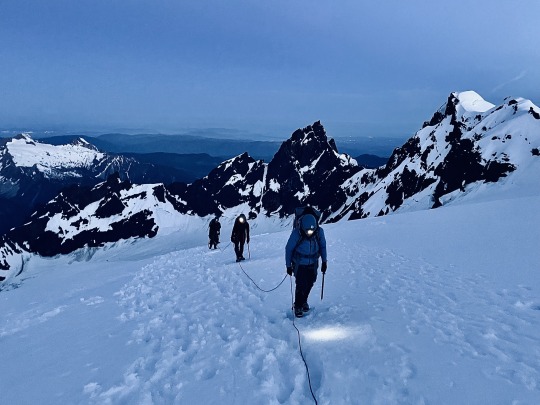
When the sun starts to rise, everything begins to feel possible again. I don't mean to say that things were hopeless, just that with the sun comes energy and a sense of renewal. Color returns to the landscape, and you can begin to be able to measure your progress concretely. The mountain casts a shadow across the earth, stretching miles. You can't believe that you are contained within that shadow, on the face of such a giant who stands so impossibly tall. Melissa stood there, and I took her picture.
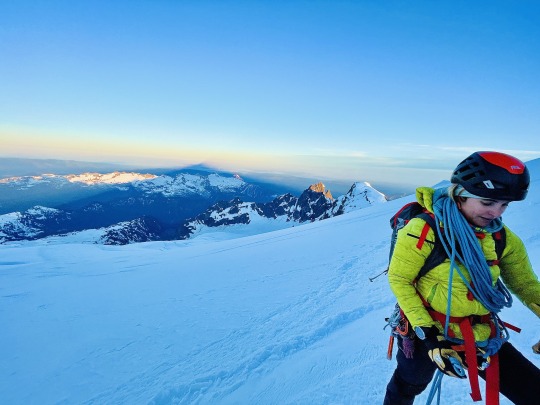
She had turned out to be not an ass hole at all. Where I sought to be her student, she aspired to teach - at once brilliant and kind. Her stride - her sport - a work of art. The precise art of what she calls slow, uphill walking. Her shadow and the shadow of the mountain impressed upon me the power of legends.
As the Roman Wall came into view - I knew we had it. We short rope in and make one last push. If Mt. Baker is a joke from God, the ending of the Roman Wall is its punchline.
Atop the incline awaits a long, easy walk to a haystack peak some few hundred yards in the distance. I was bubbling with emotion as my heart rate settled and the view became clear. There wasn't much difference between where we stood and where we were going. We dropped our packs, unroped, and ran up the summit. I was in tears.
Melissa broke her no-hugs-in-the-pandemic rule and celebrated us each in turn. I snapped countless photos and spent each frozen moment smiling. I pulled Melissa and Sharon in close. I had felt something on my heart and only needed a moment's bravery to share it.
I started awkwardly.
"I'd like to say something to you and Sharon," I muttered, barely audible over the wind, as I tugged on Melissa's sleeve. I grabbed Sharon's arm and pulled her in too. I don't remember the exact thing I said or the exact way in which I said it. I remember pausing to make sure I got it right and wondering for a long time if I managed to do so.
I told them that I had come to the mountain expecting to be impressed by one person. Melissa promised an impressive education - on which she delivered. She is of that rare quality - the kind who’s presence improves you. I came to Baker with that expectation, I confessed, I expected Melissa. I paused before telling Sharon, her gloved hand in mine, “You?” I laughed nervously. “I wasn’t expecting. A 62-year-old woman….” I nodded back to Melissa, “And you, the mother of a 3-year-old…” I didn’t want to get this wrong. “You are two people who our society labels and confines. Yet, here you are - on top of a mountain. I have to tell you….” I was choked up in earnest here and struggled to continue.
"It matters.” I said. “What you do matters. It matters to have an example of what is possible. Both of you have provided that example to me and women like me. Thank you." I sobbed. "I am so grateful for it and grateful for you." Melissa smothered me in her jacket as she embraced me, once again, in a hug. Pandemic be damned. My tears froze. While I expected a "There's no crying in mountaineering" a la Tom Hanks in A League of Their Own (it was a climb of mostly women, after all) the admonishment never came.
Sharon grabbed hold of me next and we shared the alpine view. Before I knew it, we were the last two on the summit. The wind howled a steady cheer. Celebrations concluded, it was time to leave. I stayed for just a moment longer, watching Sharon as she left. They don't make anything more beautiful than a mountain, and it's a view worth savoring. I descended, joyfully, to my team.
I didn't bury Jake up there. In Ashes to Ashes, I told the story of taking my old farm dog's remains to the top of my first volcano. He's not so much a good luck charm as he is an omen of protection. I don't need luck as much as I need safety, and he serves his duty well. Jake stayed with me through our descent to camp. I needed a little protection coming down off the Roman Wall, I thought. I wanted him close until we were off the glacier. He lays now at the foot of my tent—a very good place for a very good dog.
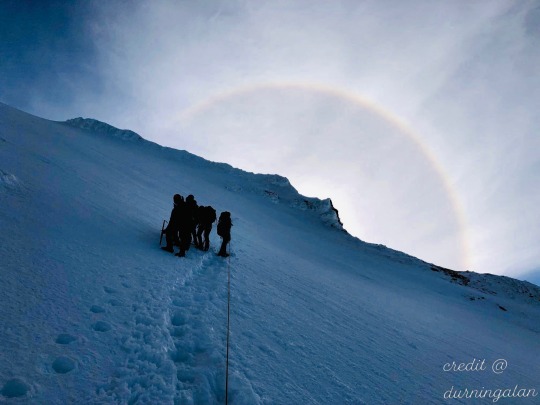
There's a natural mindfulness to climbing. I often find myself living in the present step - not thinking about the route that lies below. You forget in moments that the trip up is accompanied by an equally long and perilous journey down. From the summit, your journey is far from over. Yet, time flies by even as you stop to admire the steam vents. The rainbow that surrounds the sun refracts joy and color the same.
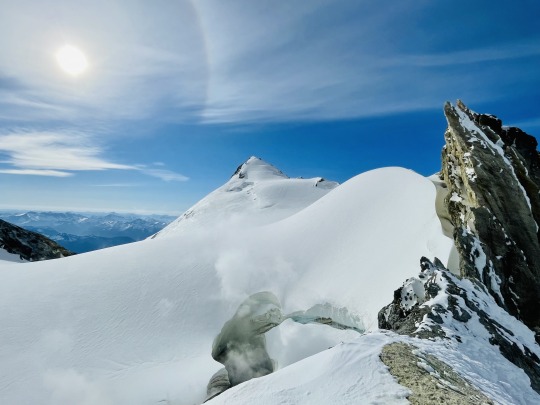
You reach camp, celebrate, pack up. Miles and thousands of feet remain even from there. That's when you realize it's ending and when I realized I didn't want it to end.
We spent the next few miles getting to know each other in earnest, savoring time and mountain views, chatting in the way of long-form hikers - about the nature of things and through storytelling. Melissa regaled us with vulnerable truths and comedic parables. We laughed. I kept sipping at the wells of knowledge around me, drinking in the moments. Laughter distracted from hunger, from wet feet, and from the dull and dim realization that all good things must come to an end. We made our way to the bottom of the mountain. Just like that - we say goodbye.
Sharon drove me back to Grandy's. We chitter like school girls - adrenaline and nostalgia collide in our post-climb delirium. We talk about the future. I realize that we are good friends. I am humbled by just how wrong a person can be to believe something about someone for no good reason.
Mom picks me up, and with her embrace my adventure is over. I’ve come full circle - safe and sound, parked in the lot of Grandy Creek Grocery.
Melissa found us there and knocked on our window.
"Your daughter is really special. The MOST special,” my hero and friend told my mom. Mom beamed with a special pride reserved exclusively for mothers of strong-willed daughters. I had been misreading things - the adventure had only just begun.
There are eight years between Melissa and I. I’m not sure I’ll be chasing Everest in that time, but I know I won’t be finished. I’ve got thirty-three years to catch Sharon at 62. In the mountain blink of sixty-one years, I’ll be as old as my Nana and I hope at least half as wise. Good thing there are so many years - for there is so much left to climb.
#mountaineering#mountains#travel#adventure#adventurephotography#traveling#travelblogpost#mountainclimbing#mt baker
2 notes
·
View notes
Text
Running for Applause
The memory remains vivid after more than 18 years. It's dusk at my elementary school, and a group of girls gathers on the front lawn. Our school, Mullan Road, is bordered on one side by a cemetery, so evening programs lend themselves well to grade-school mischief in the vein of dares and ghost stories. Unperturbed by the growing darkness, the young ladies chirp along with the evening birds a song of laughter to bring in the night. I remember looking at them, the yellow glow of the interior fluorescent lights mixing with the pale orange of the sunset to cast them in silhouette. Their long shadows looked ghoulish. They were sixth graders, my brother's contemporaries, and thus two years my senior. Two of the three were rumored to be of romantic interest to him, and I had been warned of friendship under false pretenses as Jordan's reputation as a pre-teen heartthrob grew and grew. Cautiously, I approached them, feeling two feet tall as their shadows stretched miles.
Tiffany spoke first, offering a curt hello. In the hierarchical breakdown of the triad, she was the obvious leader. Tiffany had suffered a bout of early pubescence that left her acne-riddled and full-breasted at 12. In the cruelty of adolescence, the rumors of her cup size had made it down the social ladder to the fourth graders who were just beginning their foray into institutionalized sex education. She compensated by adopting a personality big enough to distract from her bosom. I didn't understand the complexities of the emotions at play - that Tiffany was a victim to ridicule beyond her control and, as such, sought power over her circumstance. All I knew was that being around Tiffany felt like sandpaper and that tits were an unfortunate inconvenience. I much preferred the Britneys.
The Britneys were best friends. Due to their closeness, they would spend their elementary years delineated by the first letter of their respective surnames. Britney B played soccer and attended the Mormon church across the way. She was the older sister of a good friend of mine, and we were friendly and competitive, if not slightly aloof, to one another because of our age gap. Britney J? She held hands with my brother that year during our skate night. She towered over him as her early development favored height over breast size. Where Tiffany's personality turned outwards in defense, Britney J appeared to turn inward. She was shy but smiled easily - not like sandpaper at all. We could be friends, I thought, and we eventually would be. Jordan had good taste, even then.
The four of us stood alone on the lawn in what was now almost total darkness. Residual light from distant street lamps and that cold, yellow light from the school's front doors set a dim and ominous scene. Within minutes, Tiffany was teasing me. I was too young, too flat-chested, too immature. I didn't play the violin well enough, and I was slow. She threw these insults, of varying degrees of truth, like grenades. I wasn't used to being teased. I was insulated by a tight friend group and the popularity of my older brother. I remember bewilderment more than embarrassment at the grit of her taunting. Then she challenged me to a race.
"One lap." She goaded. "Around the school, through the playground, and back to the starting line. You versus Britney B."
Britney B might have been the fastest girl in her grade, but I was the fastest in school - a fact I verified with the phys ed teacher, Mr. Carpenter, on an almost weekly basis. I had reason to be nervous, but I knew I could win. I didn't think to challenge Tiffany herself, and the arrangement seemed straightforward enough. Win the race, silence the bully. So long as I survived the portion of our race adjacent to the cemetery, I knew I'd be okay. Tiffany drew up the starting line, and Britney J counted us down. My heart pounded.
"On your mark…" *thud*
"Get set…" *thud*
"Go!"
We were off, and I was flying. My body caught up with my pounding heart, and I was halfway to the cemetery before I realized anything was wrong. I was winning by too wide a margin. I chanced a glance behind me as I approached the stone wall marking the boundary between the school lawn and graveyard. Over the sound of the wind in my ears, I could hear them laughing. I was racing alone, and they laughed, in delight, at my folly. Their laughter sounded like crows, wicked and mocking.
I suppose I had a choice then—a simple one. I didn't stop to consider it. Instead, I kept running, and the rationalization followed. Keep running, I thought, they'll see. By the time I hit the playground, halfway around the school, I was sure of two things.
First - that I was setting the land speed record, and second - that upon crossing the finish line, Tiffany and the Britneys would be so impressed by my ability and attitude that they would forget their cruelty. It would be replaced by awe. I imagined them looking for me in the distance, only to run up behind them - impossibly too soon - crossing the finish line as their laughter turned to cheers. I imagined that a crowd pouring out from the auditorium onto the lawn would be there to greet me with roaring applause. I remember thinking that being good at things made people like you. I remember thinking that they would like me because I was fast.
I turned the far corner of the school and looked the distance to the finish line without breaking my stride.
No one was there.
I ran faster.
The memory ends as I cross the finish line.
I've thought a lot about this moment in the intervening years. I was right about Britney J. Ironically, it would be her height and my speed that built the foundation of our friendship as we competed together in volleyball. Britney B graduated college and started making babies per her agreement with the Lord. I didn't stay in touch with Tiffany. I'm pretty sure all three of them kissed my brother before graduating to middle school - Punishment enough for their past wrongdoings. In any case, the interaction has stuck with me - but more so my reaction to it.
I truly believed that doing well would make people like me. It’s not hard to intuit from the evidence of my life that this has been a pervasive belief. Alone, it could explain my pursuit of SCUBA diving, aviation, mountaineering, cycling, art - all those things which fuel me. I believed that the most beautiful people were the most capable people and that boobs had nothing to do with it. I believed in the direct, linear relationship between competence in tasks and interest as a person. Part of me still does, but with age, thankfully, has come a bit of wisdom and perspective - a touch of darkness, too.
In the 18 years of thinking about this, I’ve learned that for all of its ability to bolster, accomplishment also has the dark potential to alienate. It’s why so many of the incredible women I know identify with the character of Hermione Granger. The most brilliant witch of her age, ostracized on account of her brilliance. What a familiar narrative for women upsetting the status quo.
It took all 18 years to realize that I have crossed most finish lines alone. Not unsupported - not without entire teams worth of encouragement - but alone. That dark evening outside of Mullan Road was possibly the first, but a far cry from the only time I finished a race with no applause. Most races don't have that. The important ones - the ones you run against yourself - certainly don't. All said, when the dust settles and the race is over, the Tiffanies will fade into your history for all the hurt they might have caused and the Britneys (at least half of them, anyway) will remain. Their response to you tells you more about themselves than your value.
Accomplishments will bring you praise and attention, but it is the accomplishment by itself that holds the value. I can screw that up, sometimes. I can confuse the value I get out of something by the magnitude of the praise it receives. Sitting on the precipice of what feels like one of my most significant accomplishments, I am reflecting on my relationship to this process. How many miles of running, how many pounds carried, how much weight lifted. It all matters more than applause. It's more sincere. More honest. More truthful. More reflective of the effort it takes to truly succeed. More beautiful.
I've returned to the same feelings of certainty that I had when I was 10-years-old. That is, when I reach the summit of Mt. Baker this Friday, the silence and solitude of that accomplishment will roar, and my soul will be alight again.
#running#short story#mountaineering#memories#storytelling#writers#writer#writing#writers on tumblr#female writers
0 notes
Photo
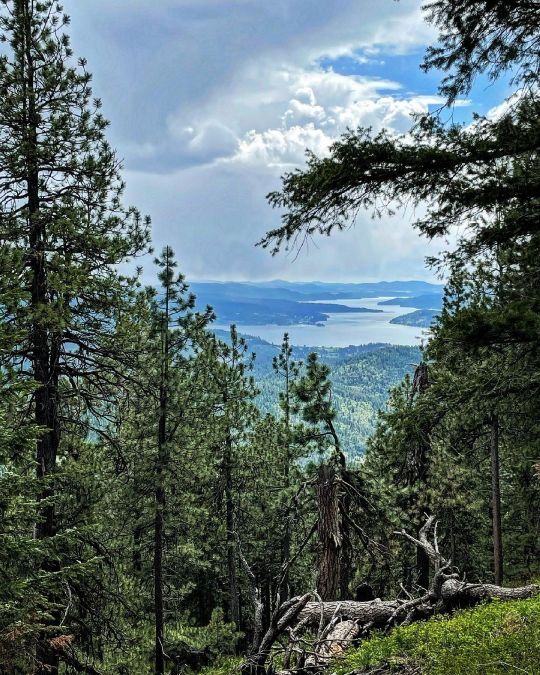
An absolutely perfect day for a walk in the woods with a dog and a husband. (at Top of Canfield Mountain) https://www.instagram.com/p/COoq7sPs5KB/?igshid=1rtg6y0al5jqi
1 note
·
View note
Text
Ashes to Ashes
Before April 23rd, I had never seen Mount St. Helens. She was a legend from my history textbooks - a harbinger of dark skies and an earth shaker. The Yakima Indian tribe calls her Si Yett, meaning woman. According to tribal mythology, the Great Spirit placed Si Yett between the battling brothers, Mount Adams and Mount Hood, to protect the region. Like other legends, Helens is a great marker of time. The question of, "Where were you when…" elicits memories as vivid as the glint of the glassy snow I found on her peak.
After her eruption, some thought the world was ending. Observing her crater, her jagged peaks, and the ribbons of steam issuing from her, still - silent reminders of her violent potential - you are struck by her serenity as well as her power. Her allure is not a mystery, and it is that allure which called to me.

I thought she would make a perfect beginning. With peak elevation at 8,366 feet, she doesn't quite make the top 10 list of Washington's highest summits. Even at her tallest - 9,677 in 1980 - she only ranked at number five. Despite her diminished proportions, her treachery remains in her grade. You gain one thousand feet of elevation over each mile which makes her a formidable challenge. It was just the challenge I was looking to find.
I packed and repacked gear, reviewed chapters on ice ax use and cold-weather layering in the Mountaineering Bible, and streamed endless hours of online videos in preparation. I hoped that all of this, in addition to my physical training, would be enough. I would be climbing my first mountain, and I would be facing the challenge alone. My companion was another inexperienced climber, and in conquering Helens, I would be solely responsible for my success - or my failure.
Alone isn't something I'm afraid of - there is something to be said for self-sufficiency. My self-reliance has taken me to beautiful and terrifying places, unlocking the world in ways I couldn't anticipate. Being prepared, however, is critical.
In aviation, before each flight, you inspect your airplane. The procedure never changes. Check oil, check gas, wings, ailerons, flaps, luggage compartment, rudder, elevator, wheels, brakes, antennas, lights, avionics. At this point in my flying career, the movements are automatic. I'll never forget the words of my first instructor, who told me, "You never want to be in the air wishing you had checked something on the ground. If you can be proactive, you should be. It could save your life."
I took the lesson with me into mountaineering as I obsessively cycled through my gear list. I knew I was ready. So why did it feel like something was missing? I searched myself for answers. Charlie, our dog, sensed my impatience and rolled over on top of my neatly organized gear - adding a collection of his hair to my merino wool base layers. I laughed as I knelt to scratch him.
"Extra protection," I thought.
That's when it hit me.
Growing up, I lived on 20 acres adjacent to miles of preserved natural land. I spent most of my childhood with a book, a pocket knife, and a dog exploring the wilderness behind our home. It's where my love of nature was born. Jake, our family dog and a legend himself was my eager companion.
"You can go wherever you'd like..." my mom would say as I packed a lunch for the day, "... so long as you bring the dog."
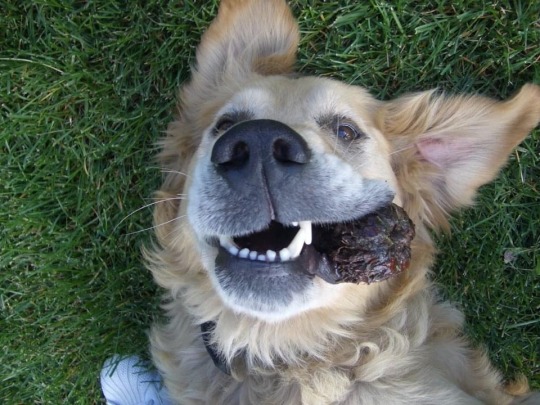
Jake was freedom, a good listener, and a ready companion. He was our protection. When my parents told me they'd be dividing our land and developing a new housing community, I mourned for myself, but I remember thinking what would happen to Jake. Had my parents forgotten him in their grand planning? I didn't know how he would survive in a shrinking world.

It ended up not mattering much. My mom and step-dad divorced before the development took off. My brother, mother, and I moved into a one-bedroom apartment, and we took Jake with us. I was right to be worried about shrinking worlds but underestimated the magnitude.
As I agonized over my lost home, Jake took on a new kind of protection. A constant in the raging sea of our changing lives, he remained steadfast. Unbothered by his changing condition, his fur caught my tears, and his ears caught my troubles. As a family, we rebuilt our lives.
Jake held on for years for us, but after his hips went to the dysplasia typical of his breed, he simply couldn't hang on anymore. He let us know it was time - another one of his great mercies - and we did right by him. We lost our best friend that day. For all the space I thought he needed, what he wanted most was to be in our arms. That is how Jake left the world. If love could have saved him, it would have.
No one quite knew what to do with his ashes. At first, it felt too soon. Having to say goodbye again so shortly after his loss seemed impossible. So Jake's ashes went into a cupboard, and there he stayed for 15 years. No moment or location ever seemed quite right.
We had to move several boxes to find him. I remembered the sound of his collar as I gently divided his remains, securing a healthy portion rather unceremoniously in a ziplock bag. It was decided. I was taking Jake to the top of the mountain - My protector.
When I made it to the summit, I sobbed. I was overwhelmed at the release I felt - making those last few steps and revealing the world in all her glory. Mount Adams feels so close you truly feel as if you can reach out and touch his peak. The cornices that form atop the crater's edge tempt and terrorize you as you long to peek over their precarious ledges to view the scenery below. Rainier - invisible behind the peak - comes into view so sharply and suddenly that it shocks you. I don't think I'll ever be able to describe the peace and power you find at the top of mountains.

As I took Jake's ashes from my pack, I looked up to find a group of skiers summiting behind me. I gasped out loud when I saw their companion. They had brought their young yellow dog - a ghost of Jake - to the summit. The dog smiled at me and came over.
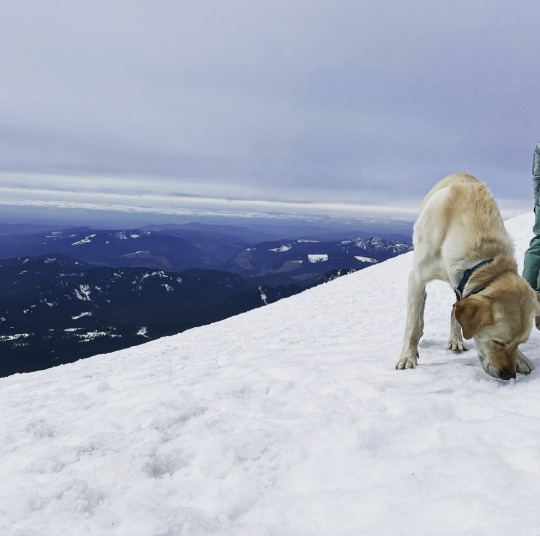
I couldn't hide my tears as I buried Jake's remains in the snow. He had waited so patiently and so long to be back in nature. Putting him there felt almost spiritual. Ashes to ashes as two legends and mythical protectors - mountain and dog - laid together. Through tears, I shared my story with the group. Pippin, their lab, licked my ungloved hand as the alpine sun dried my tears. We toasted summit beers to mountain dogs and took off down the slope together. Having protected me one more time, Jake lay at rest on the summit at last.
This June, I'll attempt Mt. Baker, and Jake will be with me again. It's been so many years since his passing; I was shocked at the depth of my emotions as I kneeled with his remains in the snow. I know rationally that his ashes add weight to my pack and don't offer any 'real' safety. You can't burn them in the cold; they don't purify water or offer sustenance. They are frivolous from the rational perspective. Yet, I can't imagine a summit without him.
Growing up, I wanted a dog so badly that I gave my mom a PowerPoint presentation about why I deserved one. It's the irrational I'm interested in now. Knowing that when I needed him most, Jake was within arms reach, ready to guide me home.
I honestly don't know if this is a story about mountains or a story about dogs. If it's a story about mountains, I could describe how every moment spent on the descent, I marveled at the beauty of the natural world. If it's about dogs, I could tell you about the two wet noses that welcomed me home: Sophie, my perfectly round Beagle with soft ears, and the sweetest hellos. Charlie, my foster fail, who, despite having been hit by a car as a puppy, approaches each day with an unrivaled sense of enthusiasm and joy. His love for life has reached me even in my darkest moments. Many happy years remain before I carry them up the summit, and for that, I am grateful.


By the time my feet hit the pavement of the trailhead, I could wring out my socks. They had been drenched in melting show. I was happy and exhausted. It struck me again how the world keeps turning even in those surreal moments when time appears to stand still. Our descent had been complicated - but proved I could endure difficult things. I sang as I removed my boots and smiled, leaning against the trunk of my car. I looked up at the mountain - invisible in the evening mist - that I had just conquered.

Mountains and dogs, I thought. A girl doesn't really need much else.
#mountain dog#dogsofinstaworld#climbing#mountsthelens#dogsarefamily#dogsarethebest#mustlovedogs#short story#mountaineering#dogs of tumblr#dogsoftheday#hiking#hikingwithdogs#forest#outdoors#adventure#traveling
5 notes
·
View notes
Photo
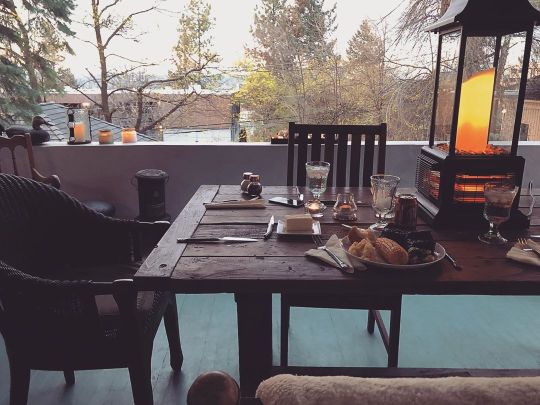
Anyone who tells you to not move into your parents basement is a liar. I have the worlds best landlords. #movinghome https://www.instagram.com/p/B_Jlio1DZIh/?igshid=ouqe5132wfdn
0 notes
Text
Jungle Cat
I didn’t expect to meet her there.
After all, there was the last place she could possibly be.
There was hours removed from the sparse echoes of civilization peppering our route in the Amazon forest.
There was a place that only foolish, blister-footed people or especially migratory birds would go.
But there she was.
There and purring.
The jungle cat.
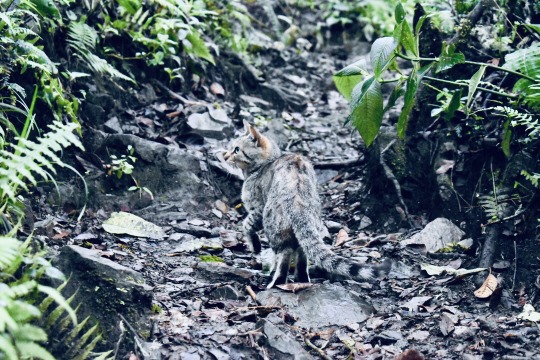
Small and defiant. Talking to us even as she approached. Fearless. A tiny, precious thing dwarfed even further by the rich foliage and the sheer magnitude of her setting.
“I’m here!” she seemed to say with her call. I looked imploringly at our guide as she squawked at us. She curled around my ankles, agile as a wisp of smoke, but tangible and insistent on being held. The question was obvious behind my eyes.
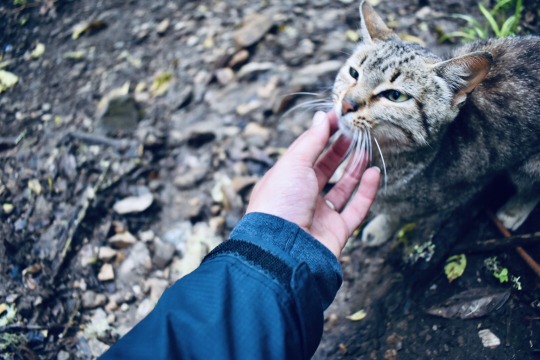
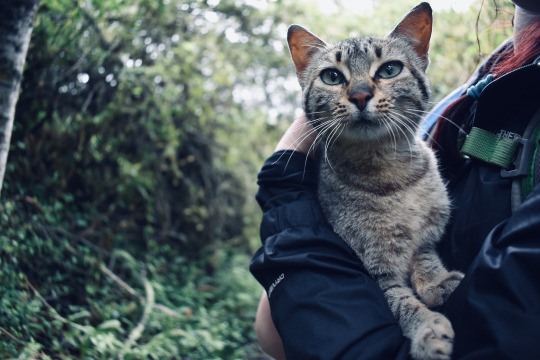
“Take her!” Answered the guide. “We can leave her at the next village.”
I paused, looking to my feet for permission. She looked up at me full of expectation. “Pick me up,” she said with a meow. A meow so impossibly big it seemed to defy physics, too emphatic to have emanated from a vessel so small. I scooped her up, bewildered but eager to follow the order.
“I’ll take care of you,” I told her, holding her close. She looked at me, puzzled. “Not that you appear to need much taking care of…” On this point she seemed to agree. “You’ve certainly made it further than I would give you credit for.” I scratched her neck, and she sunk deeper into my arms.
“I’m used to being underestimated,” she said with a meow, and so began our conversation.
An hour we walked together. She told me about her life in the Amazon and her many adventures there. I nodded in agreement at every cry, asking all of the appropriate follow-up questions.
“Well I say that must have been quite the challenge! What happened next?”
My jungle cat would carry on, expounding on all of the birds she had chased, the visitors she had met, and the trees she had climbed. Far from telepathic, we were engaged in a full-on conversation.
It felt so good to have her there, warm against my chest she was comfort and company, both. My knees were aching, the path was rocky, steep, and treacherous with mud from the rain. Her company gave me purpose and time passed quickly in conversation.
Like most cats she was very good at letting you know what you were doing right and what warranted improvement. Inevitably, I would fall down, unable to balance but keeping her close and protected despite gravity and all its misgivings. She barely flinched. At times she would wiggle to be let down. I would acquiesce, and she would run ahead on the trail pausing to look back. Mercurial in the distinct way of a feline, she would then stop mid-trail and again insist on being held. She was a mystery. Totally independent, but entirely willing to be along for the journey carried in the arms of a friend.
I talked back, careful not to break the flow of her unrelenting storytelling. She wiggled again, this time emphatically.
“Whatever you want, little friend,” I told her. “I’m here to help.” Her feet touched the trail, and as quickly as she appeared, she was gone, running up the trail to her next adventure - never stopping to look back.
My heart panged for a moment - I failed in delivering her to the village. There were still hours to go to get there, but the wills of her little heart were undeniable. She was a jungle cat through-and-through, a visitor in our adventure, and we a visitor in hers. So, I said my silent farewell.
“Godspeed, you little jungle cat. Best of luck in your adventure,” and continued down the trail.
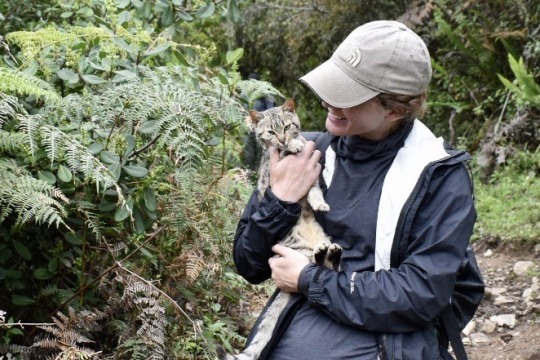
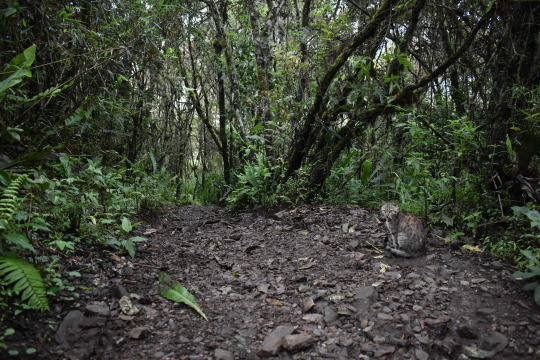
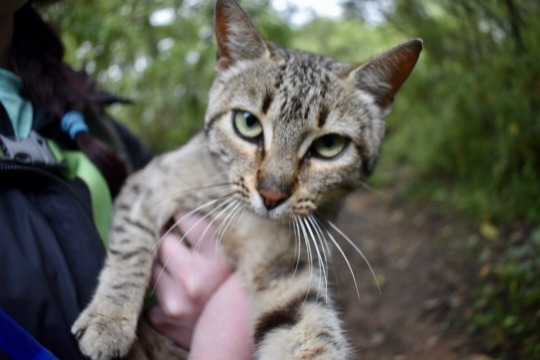
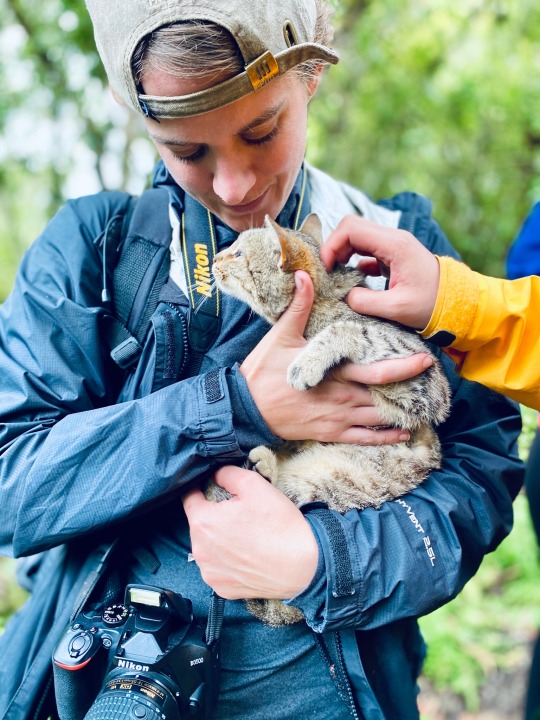
#cats of tumblr#peru#blogging#travel#traveling#animals#positivity#spilled thoughts#paradise#photography#writing#journal#camping#hiking#animallovers#adventure#adventures
8 notes
·
View notes
Text
The Summit of Salkantay
The second day of our trek would be our biggest challenge. Summit at 15 thousand and a brutal series of 7 switchbacks called the Seven Snakes to get there. We knew it would be a challenging day even before it started raining... then sleeting... then snowing as we endlessly climbed.
I was soaked totally through, shoes squelching in the pools that gathered on grassy plateaus and sloshing in the trails turned rivers by rain and melting snow. I am frozen. Feeling every minute like I am from Florida - out of breath in altitude and cold in temperatures below 60. It was well below freezing. I counted my steps, I breathed in time to them, and just kept climbing. 5 sets of 20 steps, rest. 5 sets of 10 steps, rest. Repeat. Look up. Make it to the top of the mountain.
I am there. Coca tea burns my throat. I drink it as fast as I can, fingers tingling with regained feeling as they clasp the warm, metal cup. Heat. I felt I could curl up in that small metal cup. Or at least dip in my toes. I toss a small rock, carried with me up the summit, to my guide. He had asked for stones to say a prayer to the mountain. The exchange rate, for once on my journey, seemed fair. Carry a rock, earn your tea, give a prayer. Win win win.
I adjust my cap for a photo at the summit sign and laugh as I feel snow accumulated on the brim. I think that’s the reason I’m smiling in the picture as I couldn’t feel my face when it was captured. I was literally snowcapped.
I race down the mountain. My knee - which I had been forced to duct tape the day prior due to issues with a previous injury - was strong. Strong like it knew how very badly I wanted down to the vague promise of better conditions. I didn’t think I would ever be dry again, but wet was slightly better than frozen. My guide had told me our next meeting place was some distance up the trail. An hour? Two? I don’t remember now and I didn’t really remember then. I knew I would recognize a stopping place when I saw one, structures were sparse and therefore recognizable as rendezvous points. What I did know is that my hasty descent made measuring the distance in minutes futile. I had no idea how much further to salvation.
Down kept its promises. I looked up one moment to fog, trudged on for some immeasurable distance, and as if in an instant I look up to see the sky had broken into a cloudless blue. The sky literally open, revealing peaks, and the secrets it was keeping about how far I had traveled and how far I had yet to go. Everything was suddenly visible and endless and I sat down. Not in exhaustion but wonder. Mesmerized.
A hawk dove in and between mountains, and I captured him - barely- by a waterfall. My eyes couldn’t keep up with him. He dove with ultimate freedom and I thought of flying airplanes, my heart feeling full to have something in common with a hawk in the Andes. I felt the wet earth soaking through my layers as I went from damped to soaked through on my ass. I was lost in my camera lens, stunned at the reward for the work I had just done. Happy to be wet when moments ago I was running down a mountain in fear of it.
“Of course this is why people climb mountains,” I thought. “Look at the view.”
I had been the first one up to the summit, but I was the very last to make it down. I couldn’t move quickly enough through my distracted bliss, and no one was keeping track anyway. Looking down to find footing seemed far less important than drinking in the view. Our prize. My friend offered me dry socks and my smile all but split my face - it was giddiness and joy. Giddiness over socks.
We walk for hours more. After the summit it is down, down, down into the high Amazon forest. Sunshine here. I couldn’t believe it but I had walked into total dryness - except for my feet which blistered even despite the new socks. I didn’t stop to confirm these blisters but there was a particular, painful certainty in my guess. My knee went out worse than the previous day, absolutely zapped by adrenaline. I had taped it again not sure if it would make a difference. I tried in vain to placebo myself.
Then we were there. Walking into camp at our Andean huts. I sat down on the tarp holding our bags which had been portered over on mules and horses when two dogs came and sat in my lap. Like all dogs in my Peruvian experience, they were dirty but happy to see us. I dodged their kisses as best I could. A shower to rinse them off would cost me 10 soles and didn’t promise to be warm.
Sleep was easy that night. A river raged on endlessly. It was right next to our campsite. To sleep at home I often play nature sounds on an endless loop on Spotify. Even with the barking dogs the real thing was better.
It was a day I will never forget. Day 2 on The Salkantay Trail.
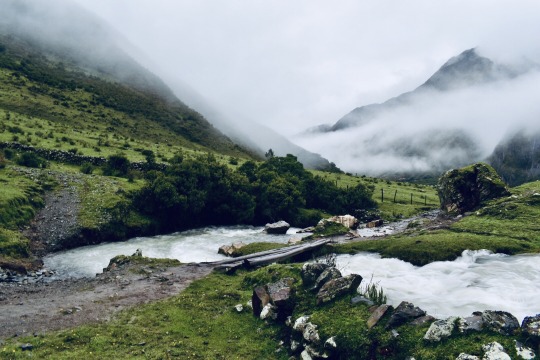
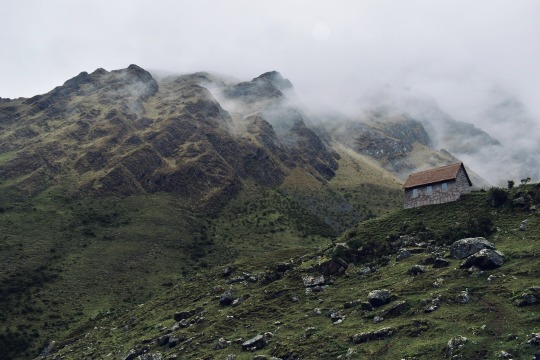
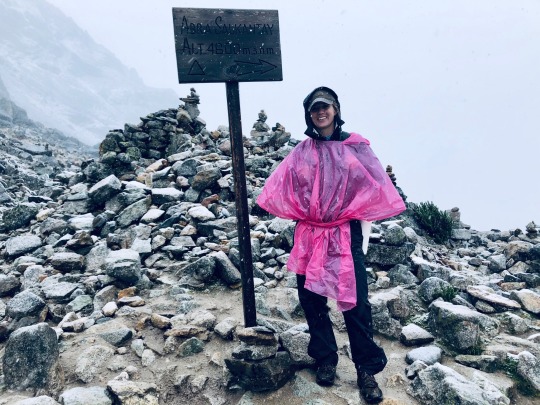
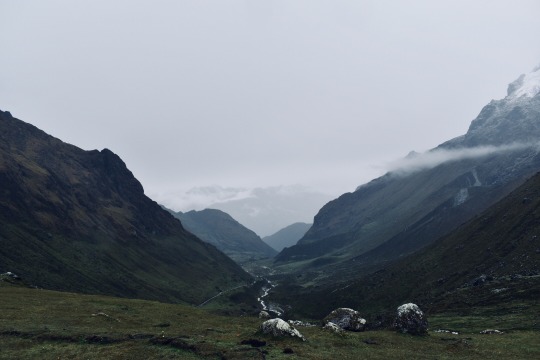
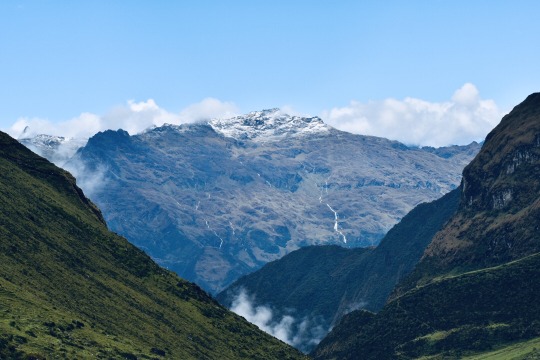
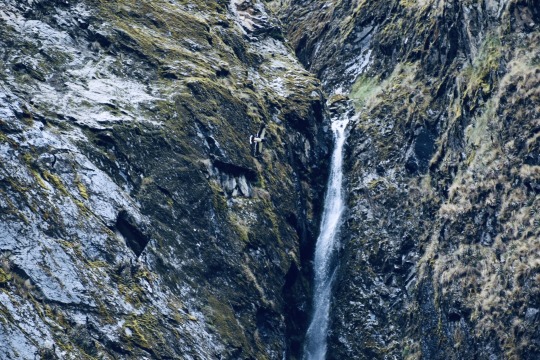
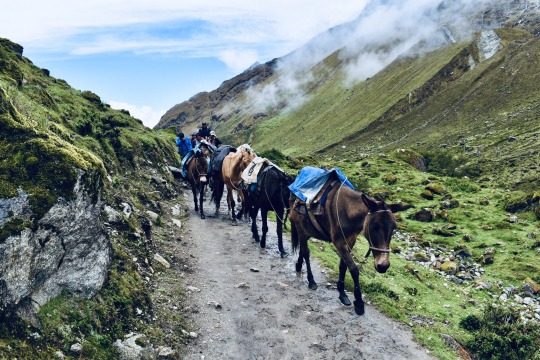
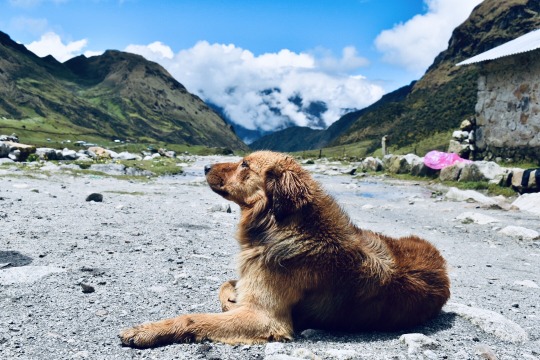
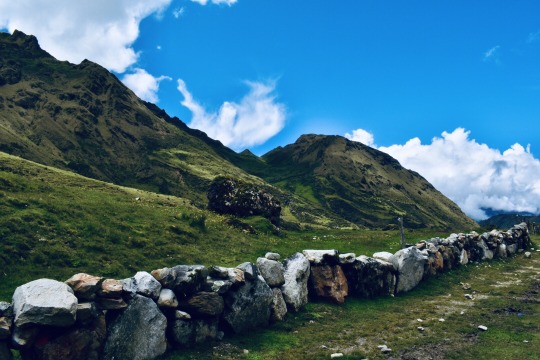
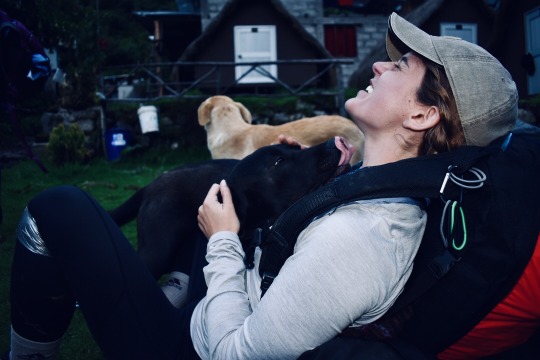
#writing#blogging#storytelling#travel#peru#salkantay#salkantaytrek#write#writer#getoutside#adventure#solotravel#solotrip#womenempowerment
0 notes
Text
And, But, Said
In fourth grade, my writing teacher told me that I should never begin a sentence with “and.”
And I’ve always hated that.
Even with my elementary grasp of the English language at the time of her instruction, I understood her justification. “And” is a conjunction, meant as a link and not a beginning. Being a conjunction it hides between phrases as the unsung connection between them; otherwise we would be all semi-colons. And what a mess that would be.
I’ve always liked to emphasize the Ands. An And is important. They are certainly worthy of the capitalization warranted by the esteemed position of beginning, and they are certainly more than a seam. I know of many beginnings that did not truly begin until And. And that is a fact.
But.
In fourth grade I was pliable and more eager to please than to I was to express, and my Ands were relegated to the middle.
And that would not be the only challenge of my year.
Exasperated, my teacher called the attention of the class. She stood between the partitions of the room, capturing the widest possible audience.
“When writing dialogue,” she said, slow and deliberate in her delivery, “avoid using the word said.” She then launched into an explanation of the many synonyms both equivalent and superior to the vulgar said that could be used in substitution. Challenging us she said, “Let’s see if we can go the whole year without ever using it!” The vocabularistic gauntlet thrown.
And I did it.
Dalton didn’t do it.
The next writing sample he turned in had a said.
I know because it happened immediately after the announcement. Head in hands, Mrs. Winters said, “What did I just say?!” And handed his paper back to him with every iteration circled. I could see the crimson markings from across the room.
Not me. I would do everything in my power to avoid the humiliation of the red pen. I exclaimed, pronounced, uttered, cried, whispered, and murmured my way through the entire fourth grade, never once using the word. Its absence became a habit.
Final papers turned in I patiently waited for the parade celebrating my great achievement. I waited for the accolades. For the applause. For the announcement. For the reward. For a single sign of acknowledgment. Surely in all of her grading, Mrs. Winters had carefully tracked our word-use in anticipation of celebrating the Great Achievement. Surely she had not neglected to notice the absence of the accursed said. I waited. I expected. And I was disappointed.
No parade. No purpose. The nights spent with thesaurus in hand and tabbed for expeditious reference were, like me, insignificant. And I blamed Dalton Leinin.
Though not all the elements of the lesson were lost. I learned that not all tasks are worth doing. I learned the importance of clarifying a tasks significance before dedicating yourself to it. I learned that the pursuit of praise, while a powerful motivation, is not a worthy endeavor unless the terms of that praise are specified in writing. I learned to trust no educator as infallible. And I learned that I hated Dalton Leinin. I became a fourth-grade skeptic.
Then.
Then it changed again.
It changed when I discovered that Shakespeare invented words. A fact that I initially consumed passively, but from which the roots of intense curiosity took hold. Even now.
His words. Where did they come from? How were they communicated as to be understood? How can one account for the shortcomings of language through invention of terms that are wholly new and fully untested? I want to know how letters fit together to make concepts yet unexplained. I suppose I thought the English lexicon complete. That there could ever be an unexplored Mariana Trench of expression startled me. How deep does one must dive into the seas of language and communication to find something you cannot describe with the tools already given? The dictionary is not a small publication.
Bandit. Critic Dauntless. Dwindle. Elbow (as a verb).
All his. All new.
And I was enchanted again. In love with language. In love with words. Appreciating the Ands and saids, learning the lesson my fourth-grade teacher likely intended all along.
And that lesson was the love of words.
#art#expression#writing#wordporn#blog#storytelling#writerscommunity#wordgasm#shakespeare#writer#write#writers#read#honeybuzz#blogger#bloggin
0 notes
Text
Mirror, Mirror
I am about to deliver you a fact that is both shockingly terrifying and throughly liberating. Are you listening?...
Okay, then.
Here it goes.
The fact.
NOBODY IS REALLY LOOKING AT YOU.
Shocked? I certainly was when I realized how little I was being looked at having spent so much time and energy in desperation, trying to be seen. Shocked and insulted, I began to notice the lack of looking. It was everywhere - absent from banks, beaches, and bookstores alike. Nobody was looking over newspapers in judgment, there were no silent whispers or murmuring large crowds. I was terrified of the isolation. Why weren’t people looking at me?
Certain exceptions became evident, of course. Occasionally one may get notice, but only intense notice leads to looking. More often there is circumstantial notice where one is more likely unseen than thoroughly examined.
But I’m telling you... overall... nobody is really looking. At least not how you think.
And here’s how I know:
When I visit my parents home in Washington I am often trapped by a mirror. An incredible, illuminated, magnifying mirror owned by my mother. Incredible and yet common, this mirror is a staple of most homes and hotel rooms. You know the one. Every pore becomes a crater, every wrinkle line a canyon in your skin. Dark hair grows from corners of lips, on chins, and in all the wrong creases of the eyebrow. It is a mirror that lends itself to preening and plucking and perfecting. It is a mirror of strong jurisprudence delivering swift judgments on beauty and self-worth. It is a harsh mirror that seems to reveal you in each of your flaws magnified by 10 and illuminated, too. It is the mirror that you ask, “Is this really what I look like?” And it unflinchingly reflects the answer you dread.
“It is your reflection, isn’t it?” It says. The mirror is tricky that way.
Well...
I hate that fucking mirror.
I hate that fucking mirror because it has lied to you. Not outright - those pores are still there. Lines too. But nobody is really looking at you. I promise they don’t see craters or holes. Not like a mirror does. Nobody puts your face under a microscope (power set to 10X) and evaluates your imperfections in a cold, uninterrupted silence. Certainly this is not the practice of the people who really matter.
Imagine it. After one particularly eye-watering mirror episode, I sit nose-to-nose with my husband. Our foreheads touch as we laugh through our day and express the mutual weirdness we call love and he never once mentions my eyebrows. I search the annals of our relationship history and never once has he disparaged or praised them if I wasn’t explicitly soliciting feedback. Their existence has not once been mentioned organically over the course of our relationship, not even in passing. In fact without glasses, Ian is much closer to legally blind than freelance aesthetician offering discounted brow liner with consultation. He sees my smile, he sees my eyes, he feels my warmth, and that is what he consumes from me. Not my god damned eyebrows. Not what the mirror told me was important and jarring and resolute. The mirror cannot even perceive the things that matter - how could it, and why would we expect it to?
That is how I broke the spell of the mirror. I pressed my nose up to Ian and asked myself, “I wonder how he sees me” - and as though in answer to my question, silently posed, he squinted back.
The answer to my question: “Not well.”
Spell broken and fog lifted, I laughed, renouncing the mirror and all of its teachings. I would polish and preen my heart, instead. The invisible parts. The thoroughly liberated parts that recognize that by removing myself from the center of judgment I was free to express and be. To unapologetically exist. Those were the parts worthy of magnifying to examine, certainly more worthy than the cartilage of my nose.
Maybe... just maybe... the better way to say “Nobody is really looking at you,” is to say “The content of your character is far more important than your pursuit of physical beauty standards and you are free to care as much or as little about your eyebrows as is warranted by your soul.” But I like my way better. It can shock you out of your fear if only just for a moment.
The fights not over, though. Even now we are still entrenched in a contest against the mirror and all of its tyranny. The mirror has allies, formidable and intimidating.
“Everyone is looking at you.” They say.
The bathroom scale. The false friend. The grade point average. The salary. The happiness of others. The socially published highlight reels consumed en masse. These rogues! All the things we measure ourselves by form an army assaulting our worth and self-love - but we can expose the flanks of these enemies by dropping bombs of unabashed self-adoration. By recognizing that no one is really looking at us, sharing that secret, and building our worlds up around us we take away the power of judgment. We dismantle the power we have given tangible objects to measure intangible things. By asking, “How do I see myself?” Instead of “How do they?” We advocate for our hearts. We look at ourselves. We do this because no one else is really looking, and when no one else is really looking, we are free.
Be free.
1 note
·
View note
Text
A Peruvian Day
I want so badly to tell you this story in chronological order. I want to start at the plane ride there - back when I was foolish and naive - and end on the plane ride home as I settle on all my realizations - both wise and soulful. I want to be methodical and systematic in the telling of this story so that you understand its length, depth, and volume - I want your mind to measure time and space to understand the story of my adventure in its completeness.
Except.
That is not how magic works. There is no linear thought in magic, and to tell you the story of this adventure requires magic. The moments of excitement, self-realization, pain, mindfulness - they are a chaotic vortex of stories and memories pulled from photographs or coincidences at random. So instead of starting with the beginning, we are starting with a day.
The first day of my trek.
This is the day I met 9 strangers who became friends and proved me wrong about my loneliness. The day I gasped at waterfalls and mountain peaks and crossed bridges and looked for interesting rocks. This is the day I appreciated clouds in daylight for the way they play with light. This is the day I resented clouds for their selfish way of concealing the untouched sky at night. This day, I climbed further than the rest above Humantay Lake for the solitude of stacking stones, and capturing the very edge of the plate forming this great tectonic mountain. This is the day that descending took me longer than all the rest because of all the moments I stopped to view through my cameras lens, hoping to capture even a shade of the beauty. Oh... and it was Christmas.
I am happy to share this day with you. A single day in Peru.
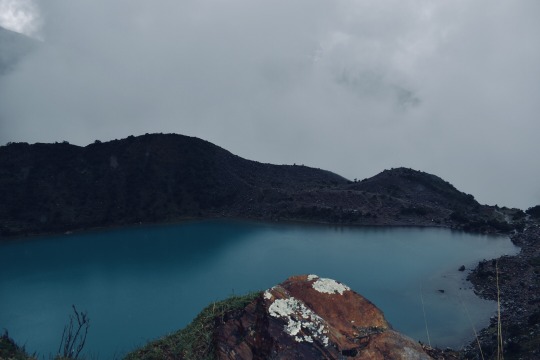
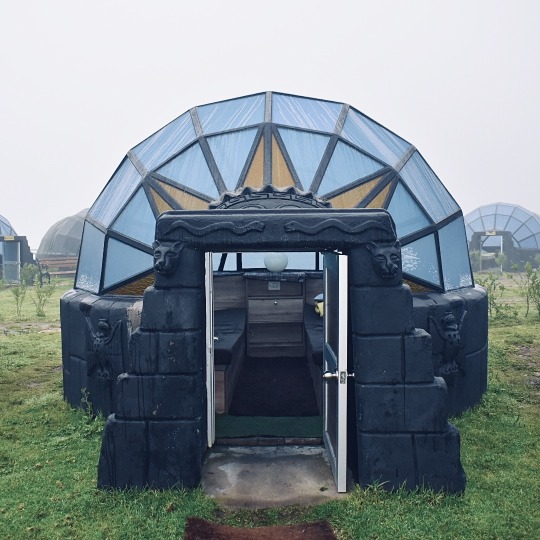
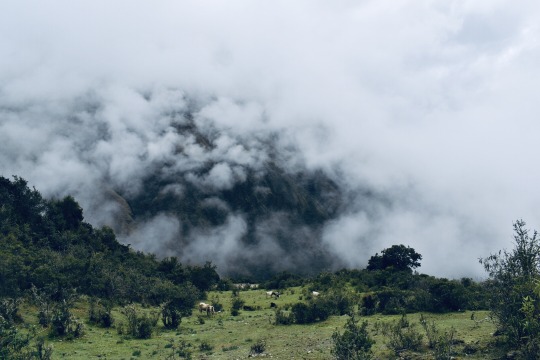
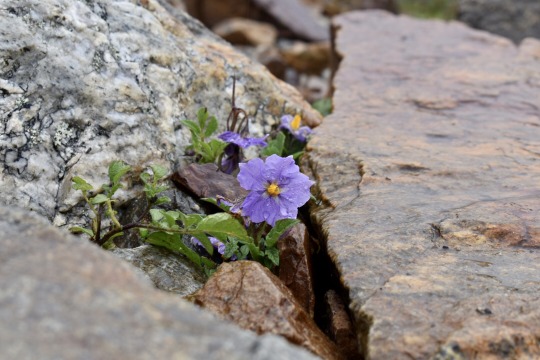
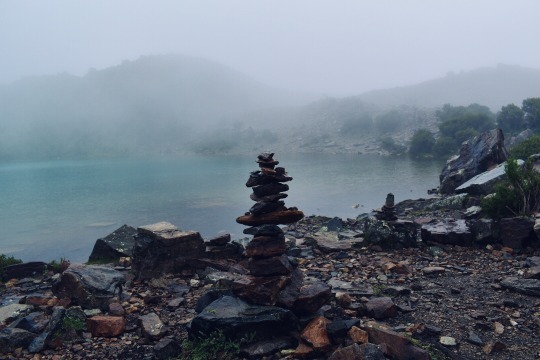
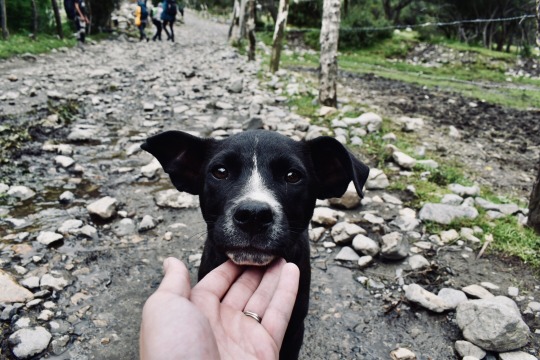
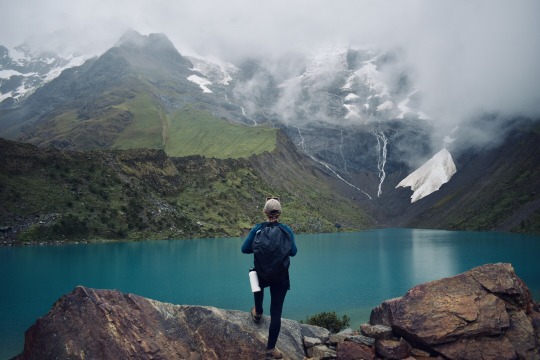
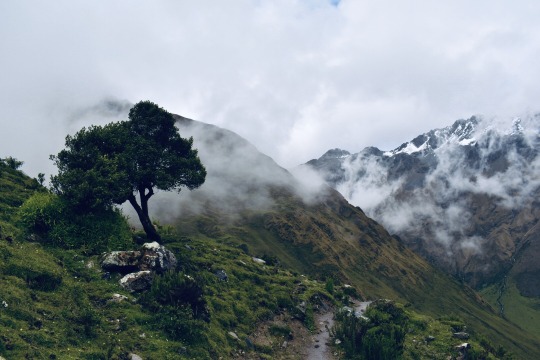
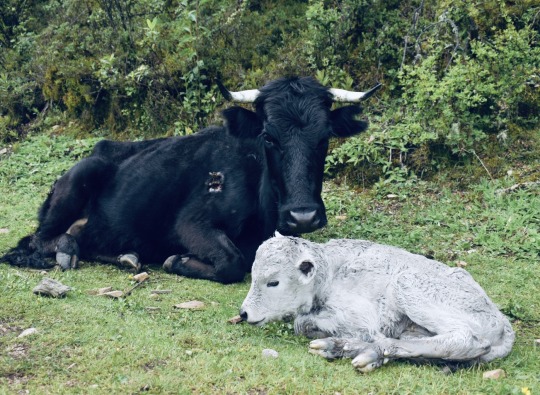
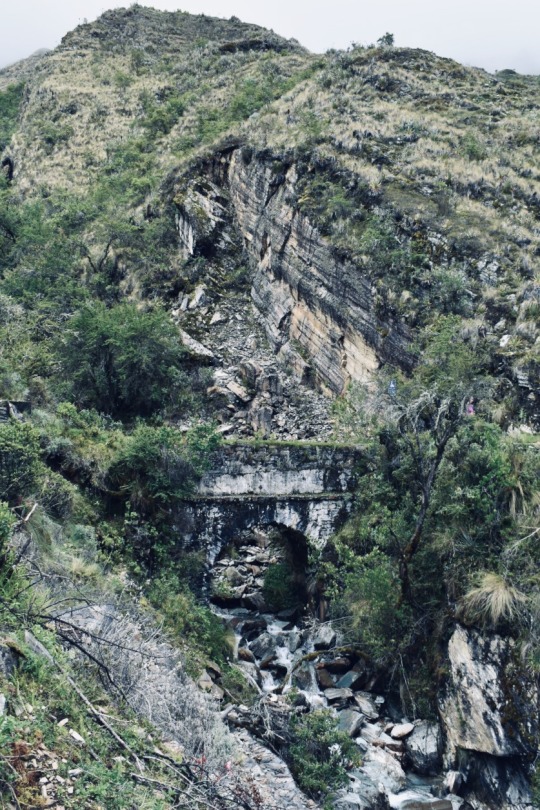
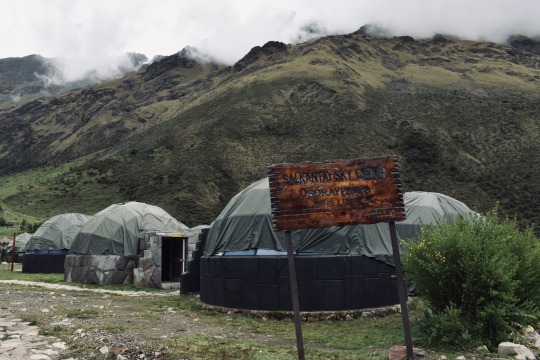
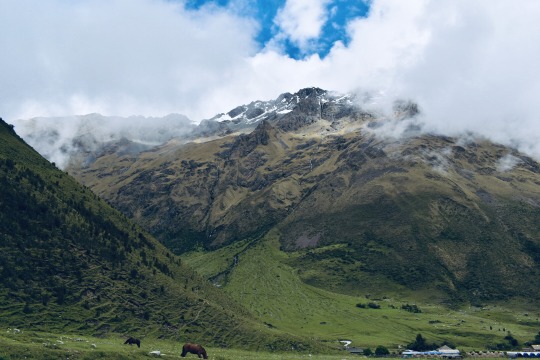
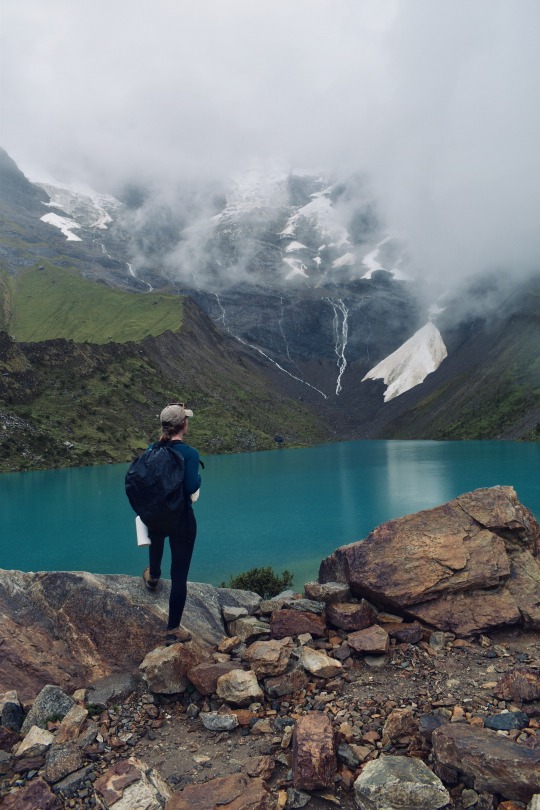
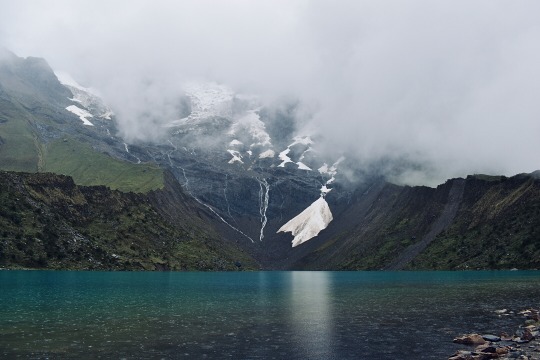
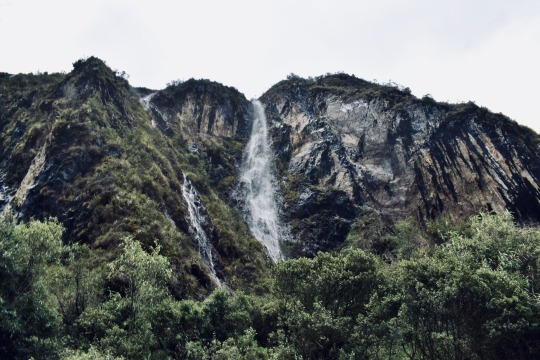
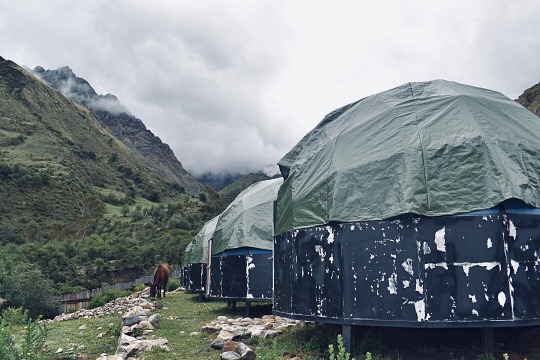
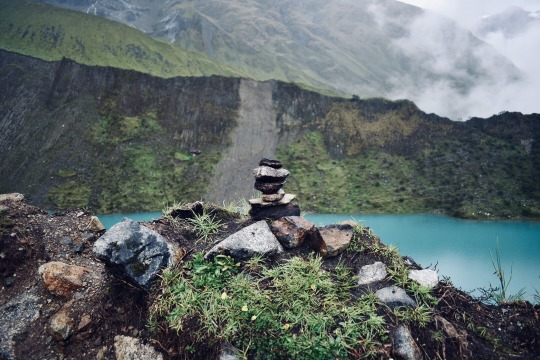
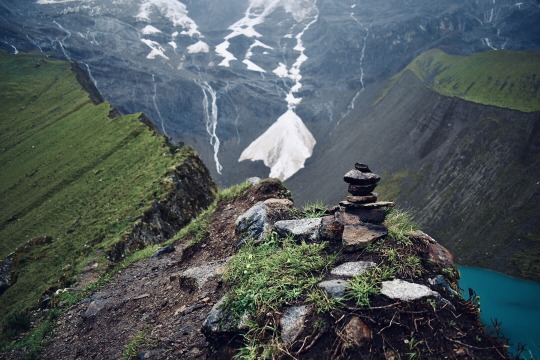
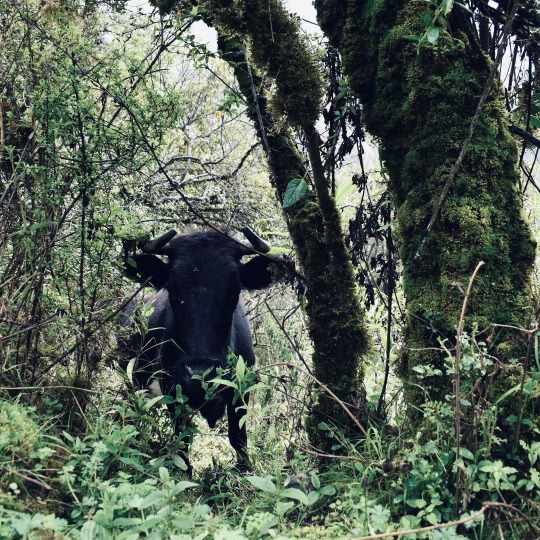
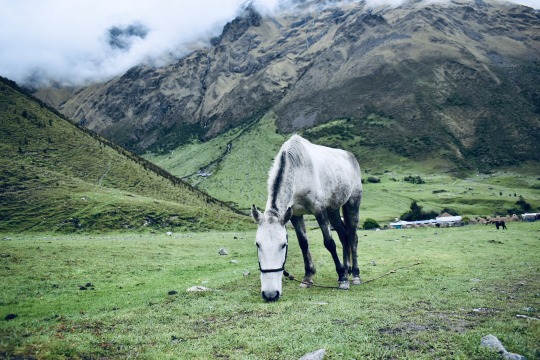
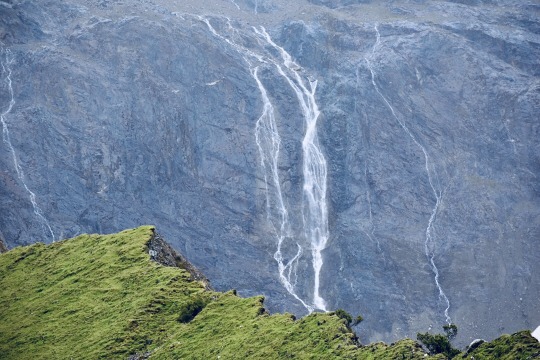
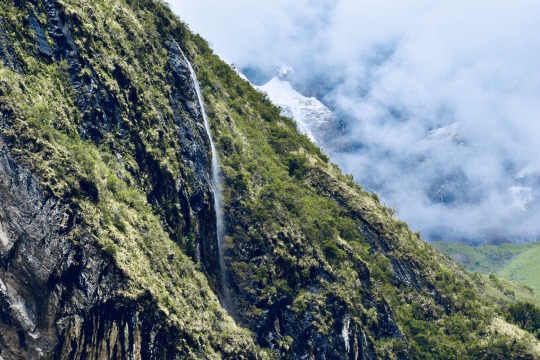
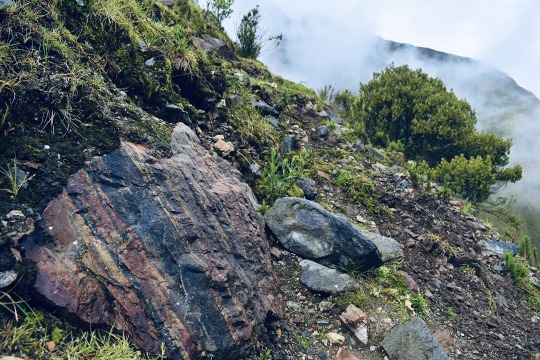
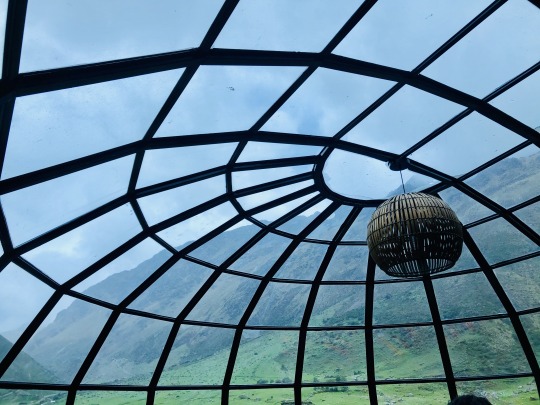
#peru#salkantay#trekking#travel#getoutside#wanderlust#adventure#doyoutravel#explore#goexplore#wonderfulplaces#lovetotravel#roam
0 notes